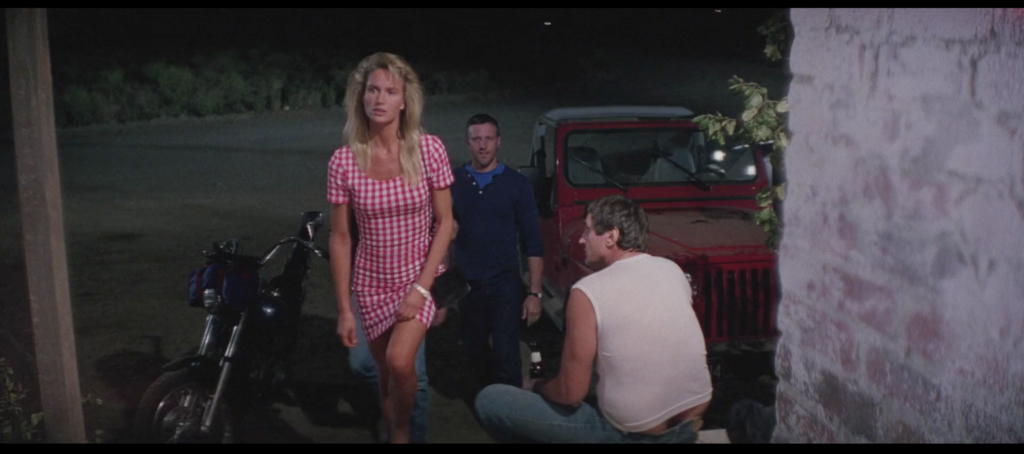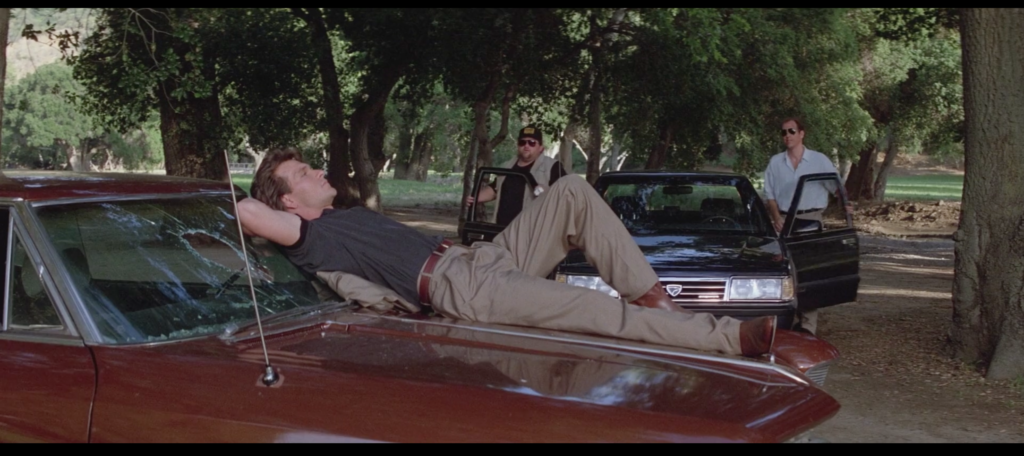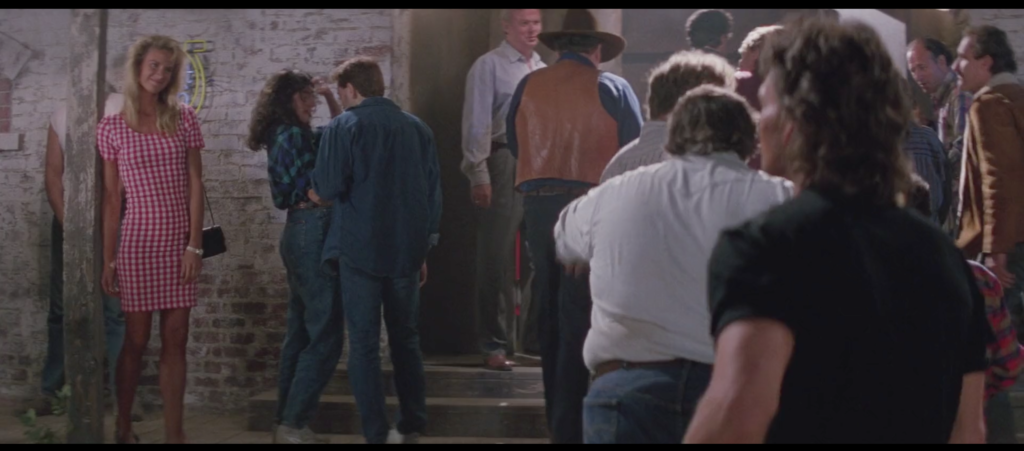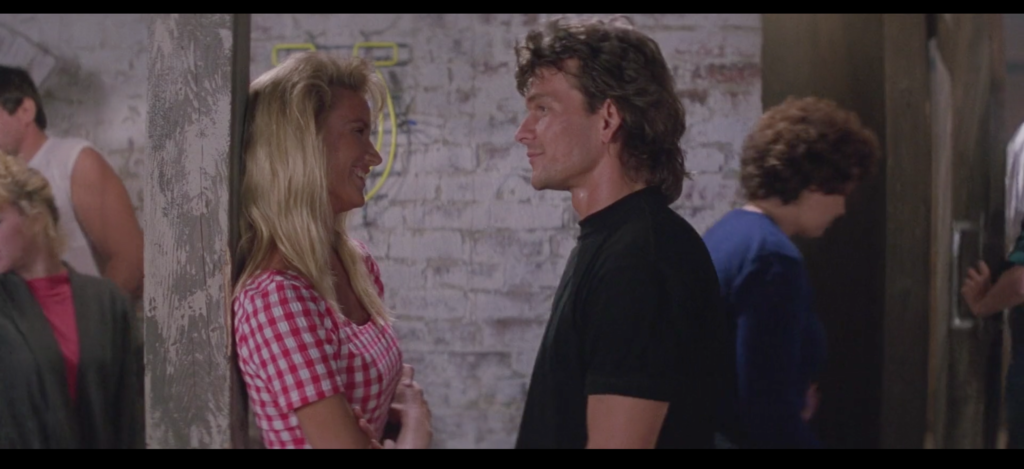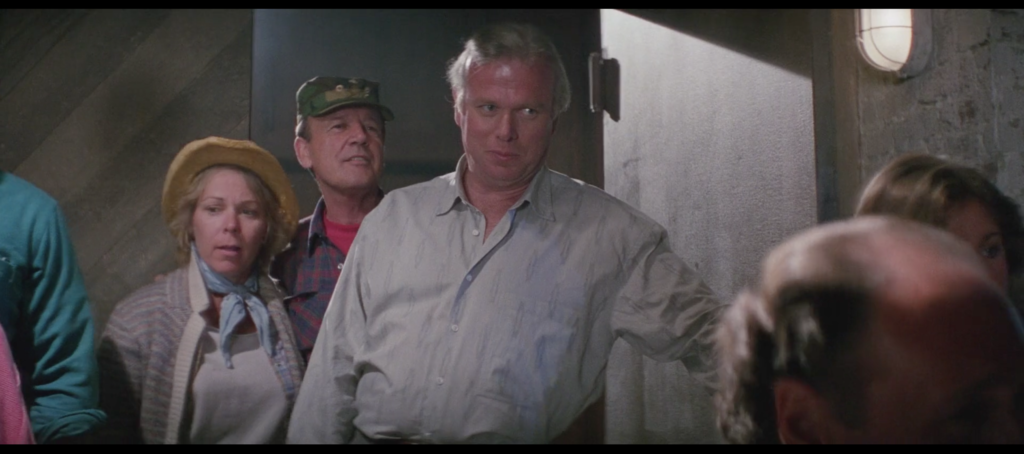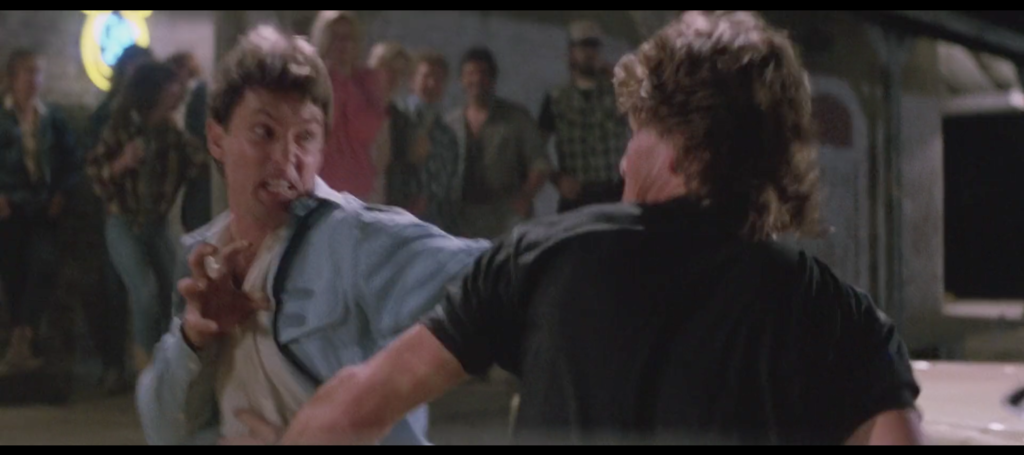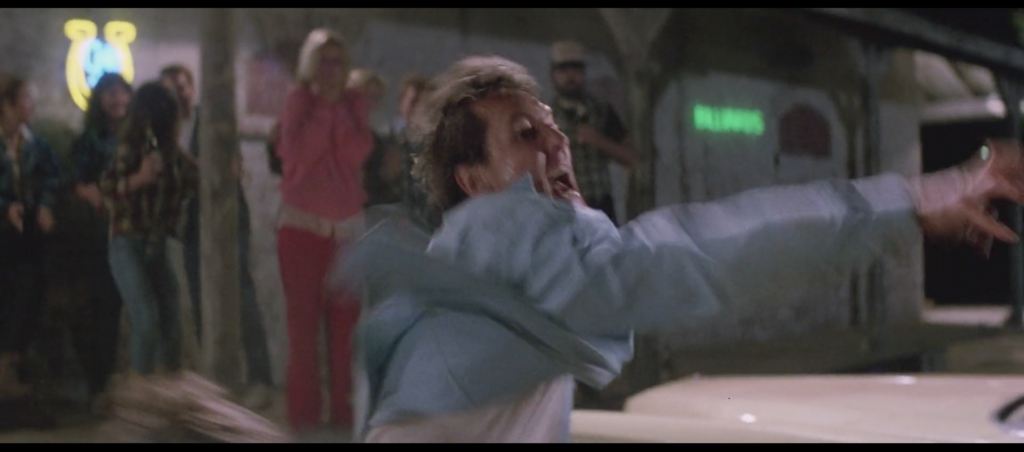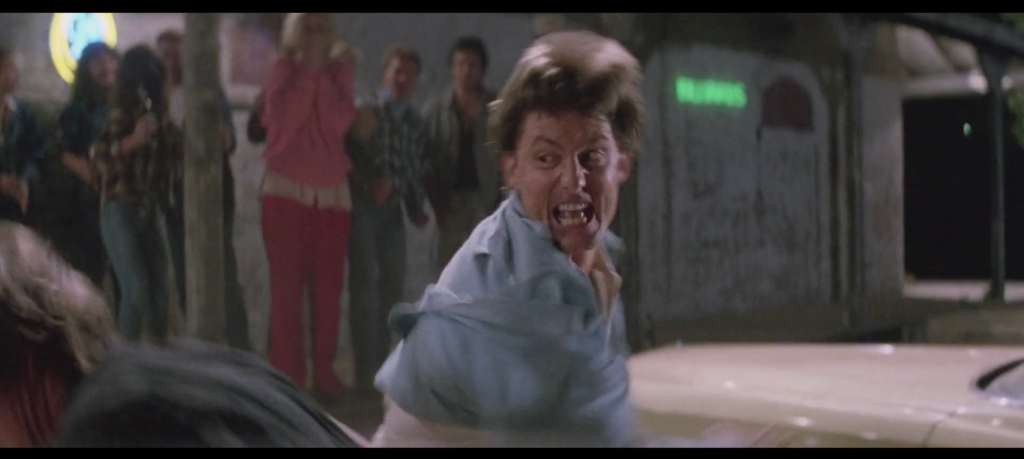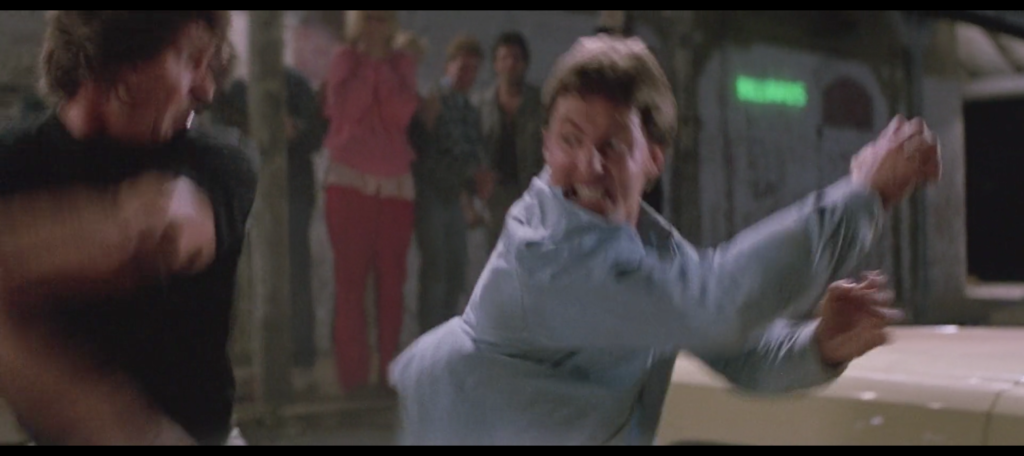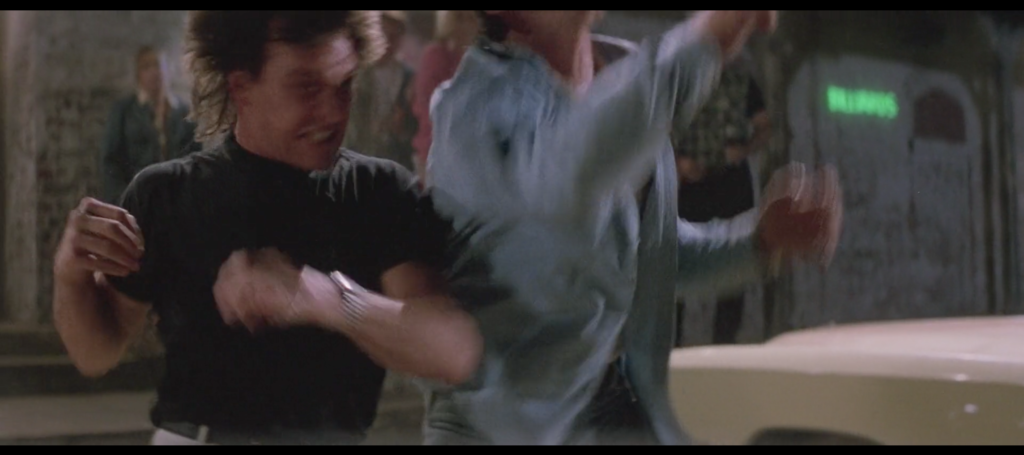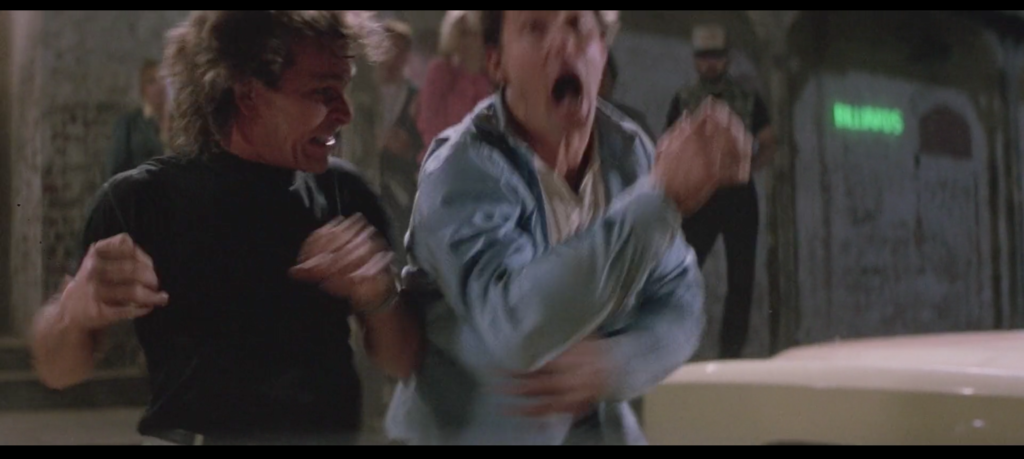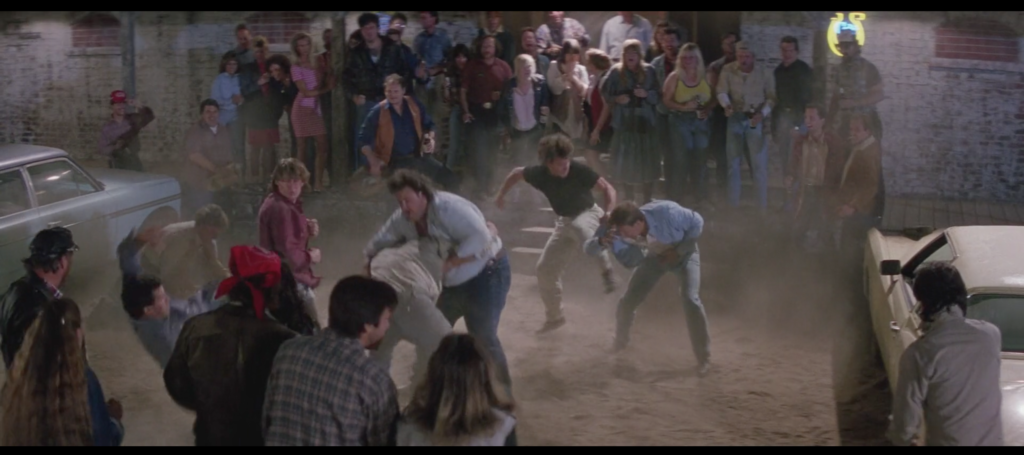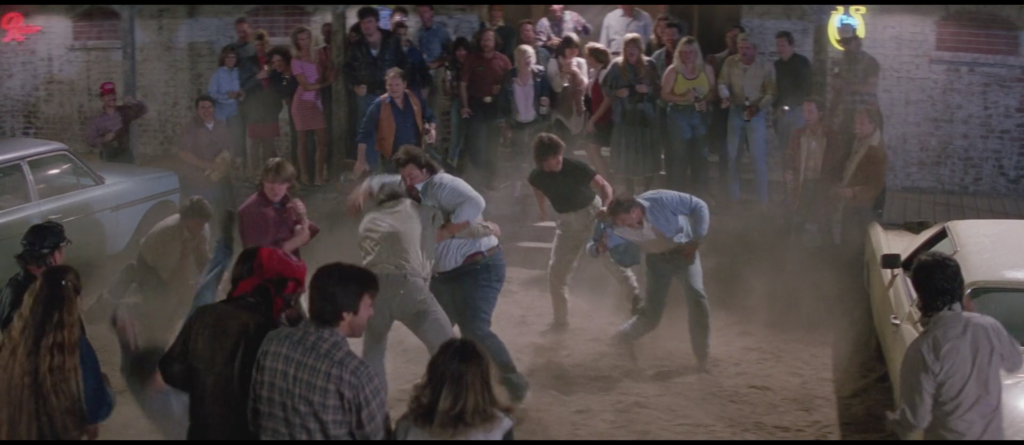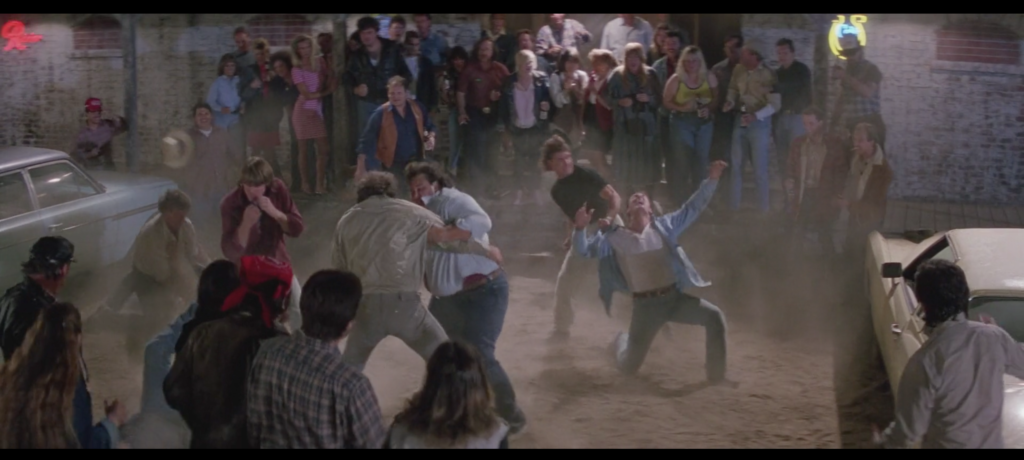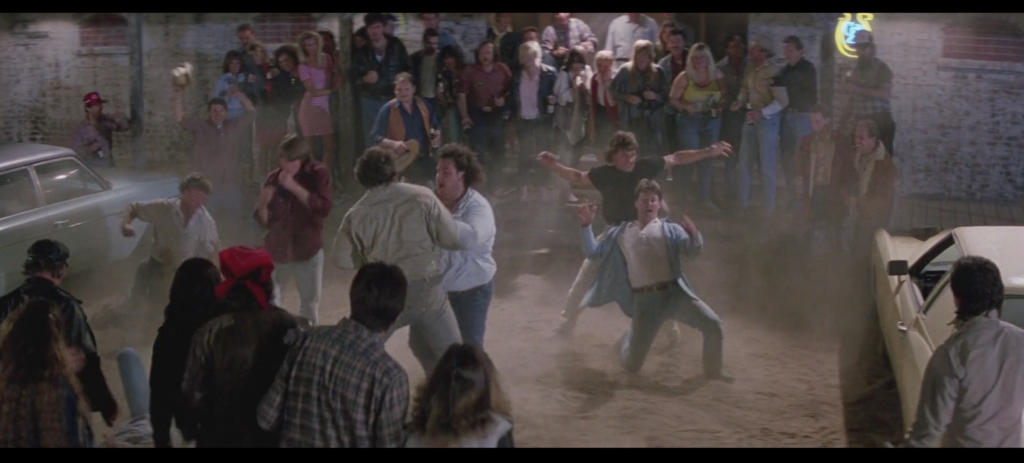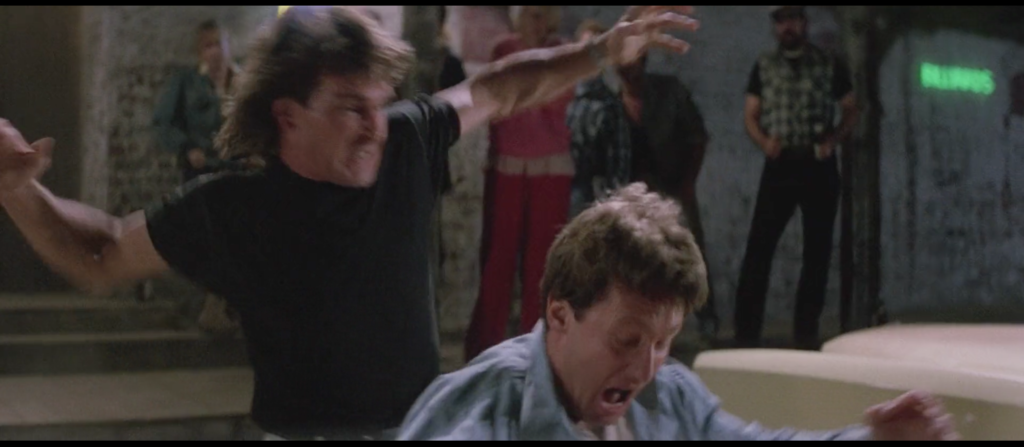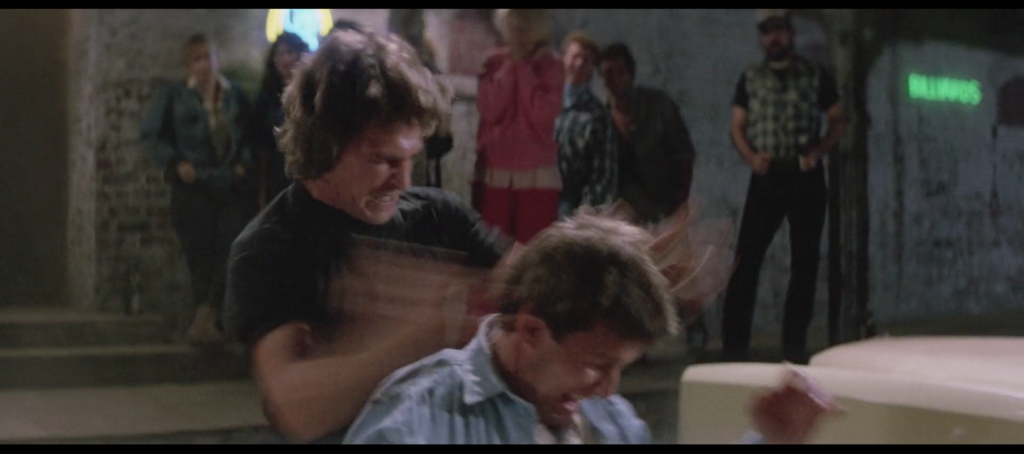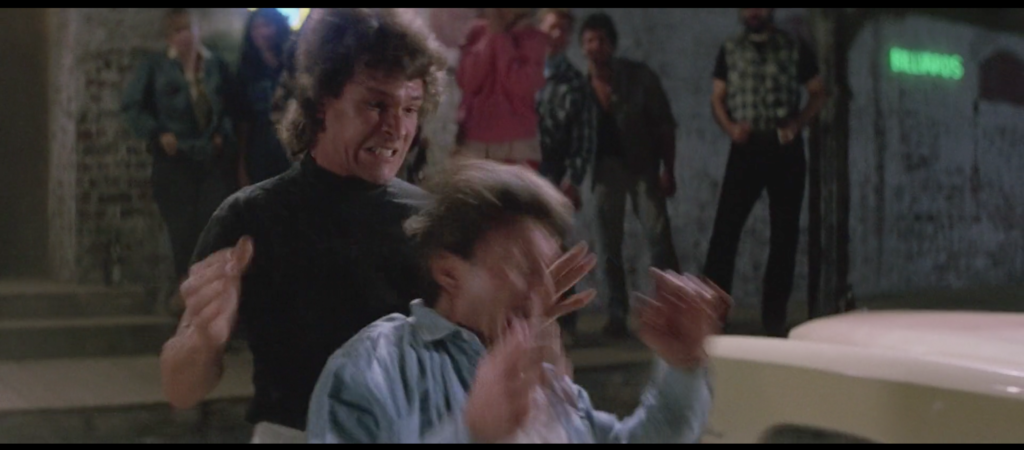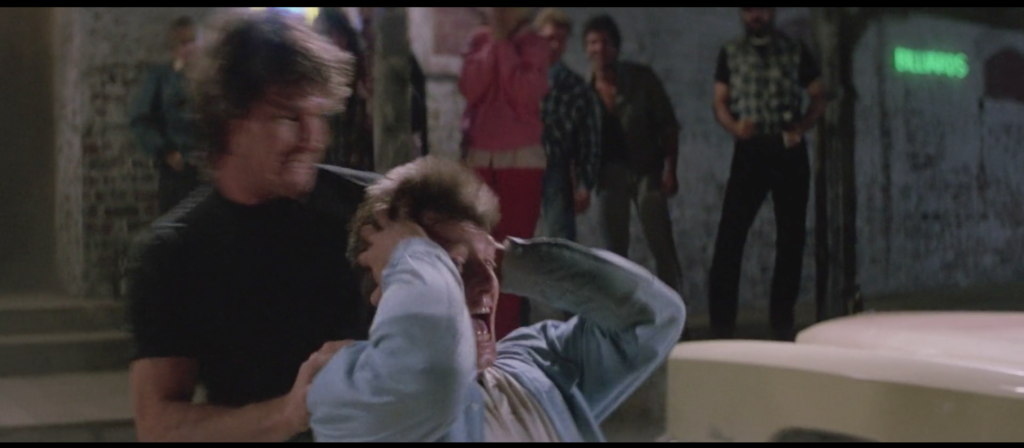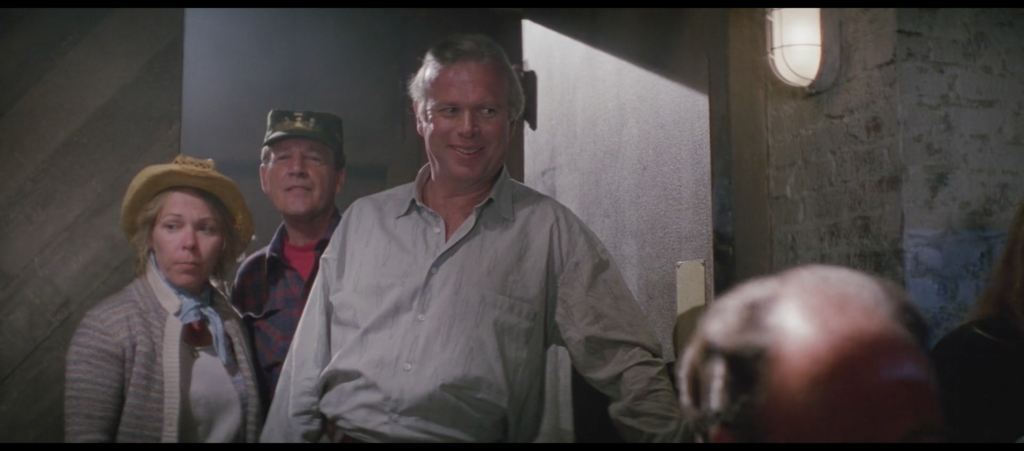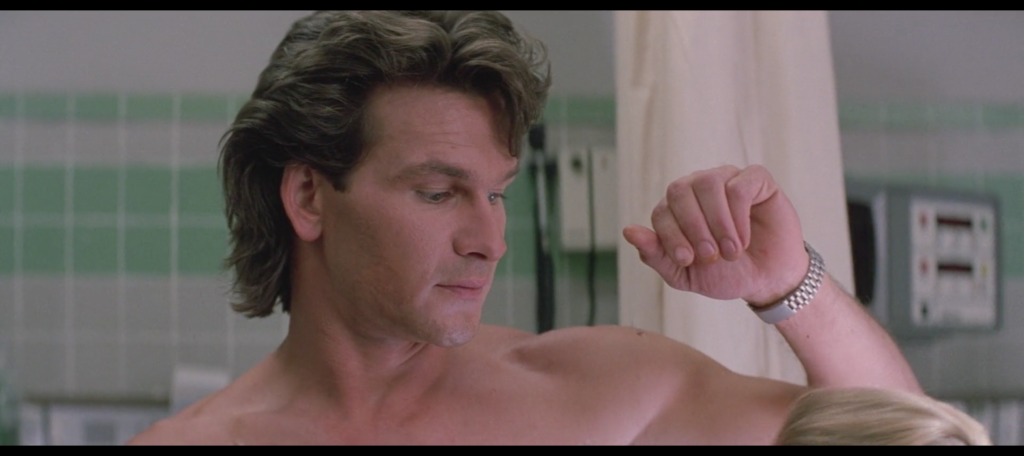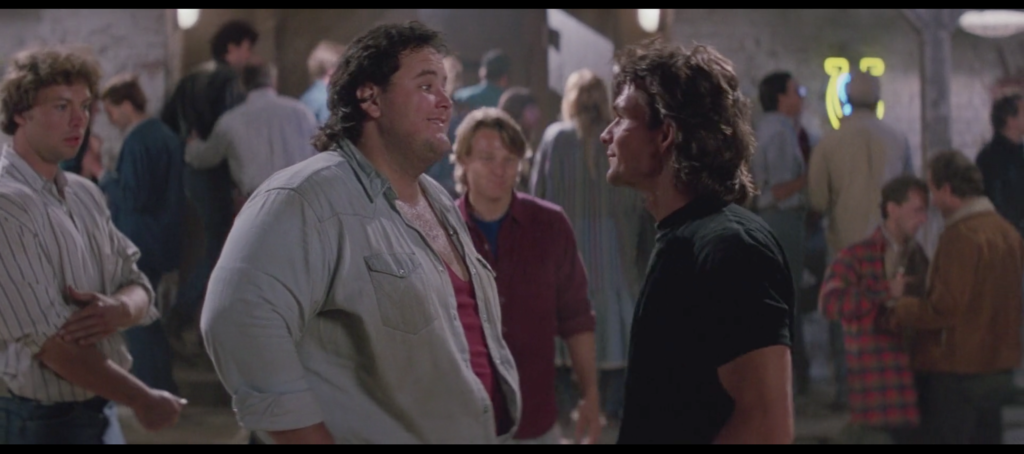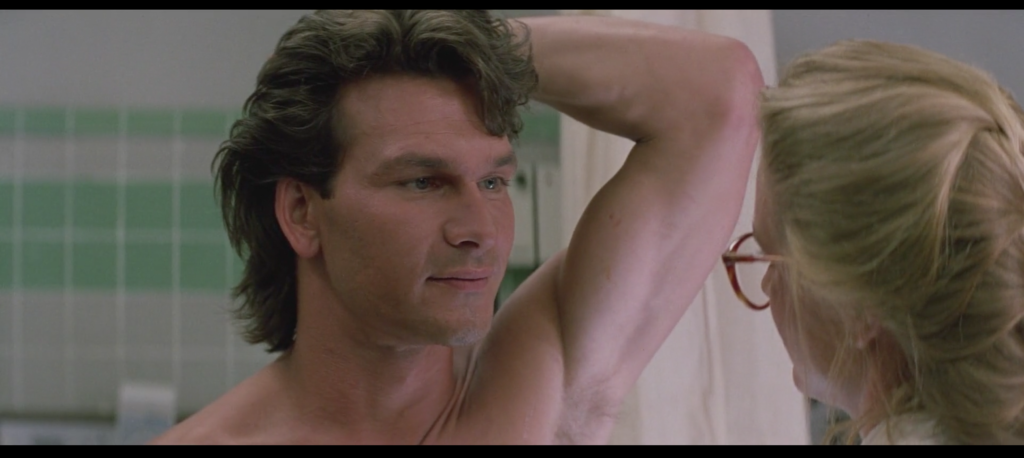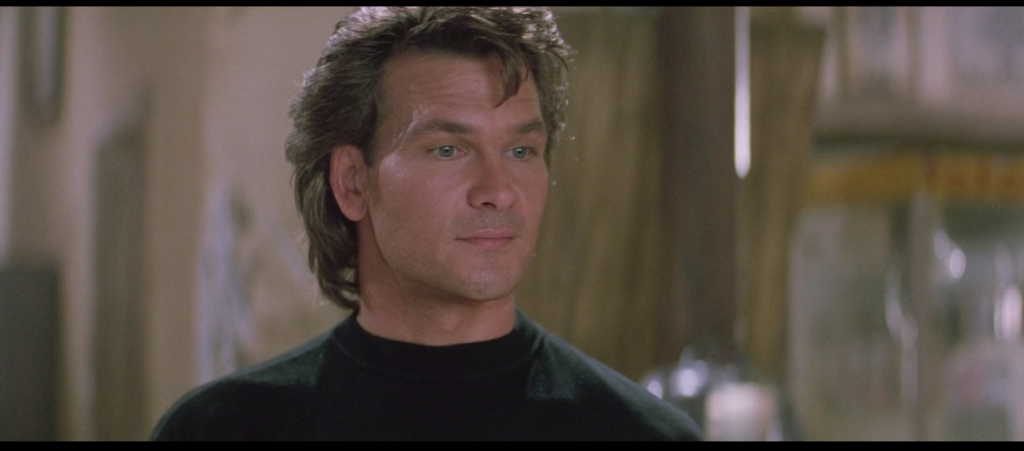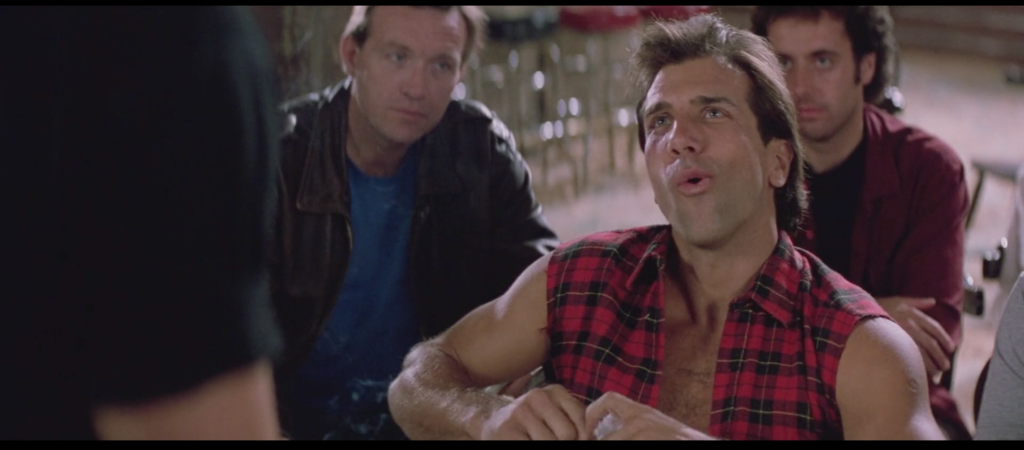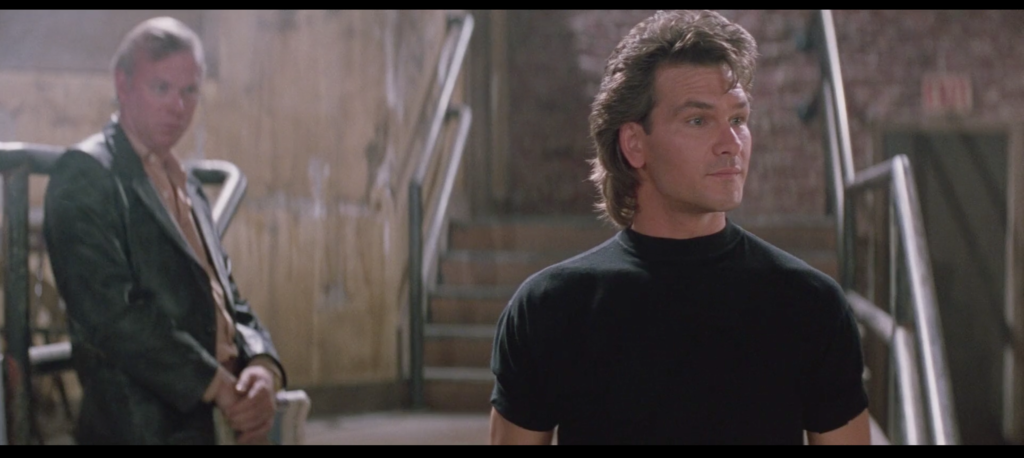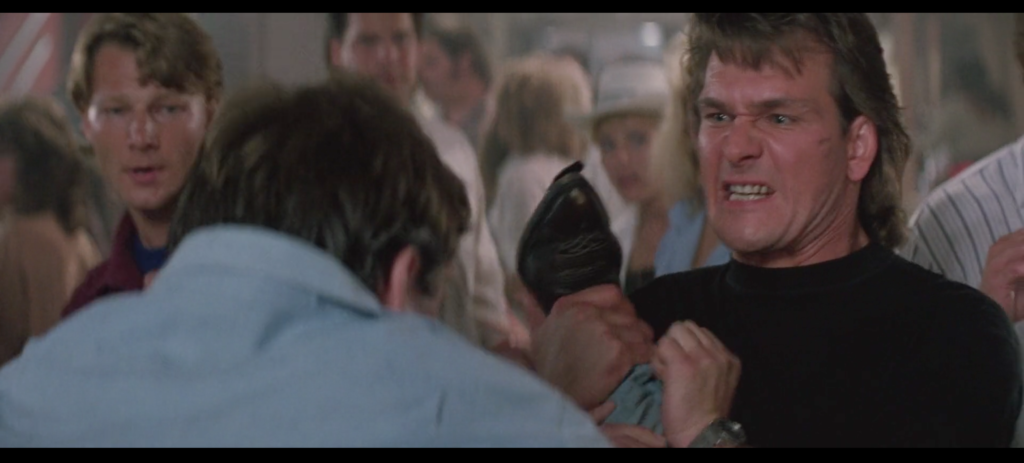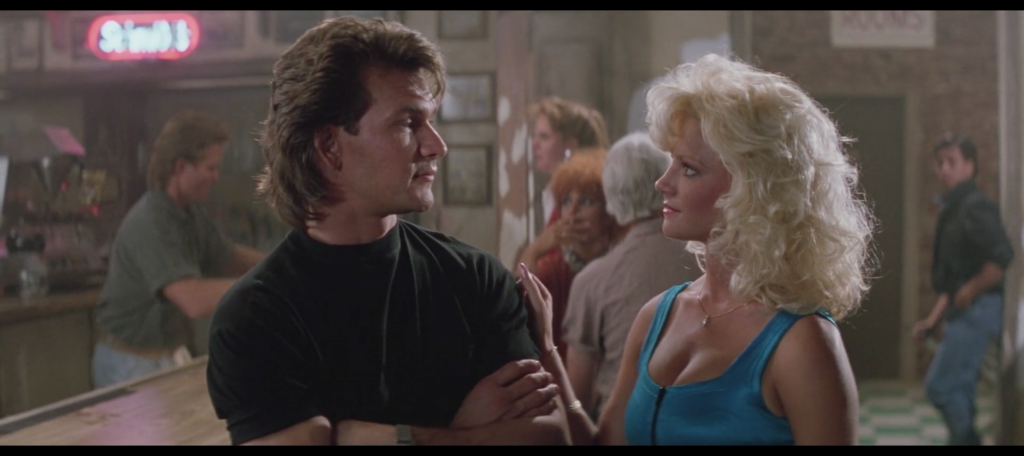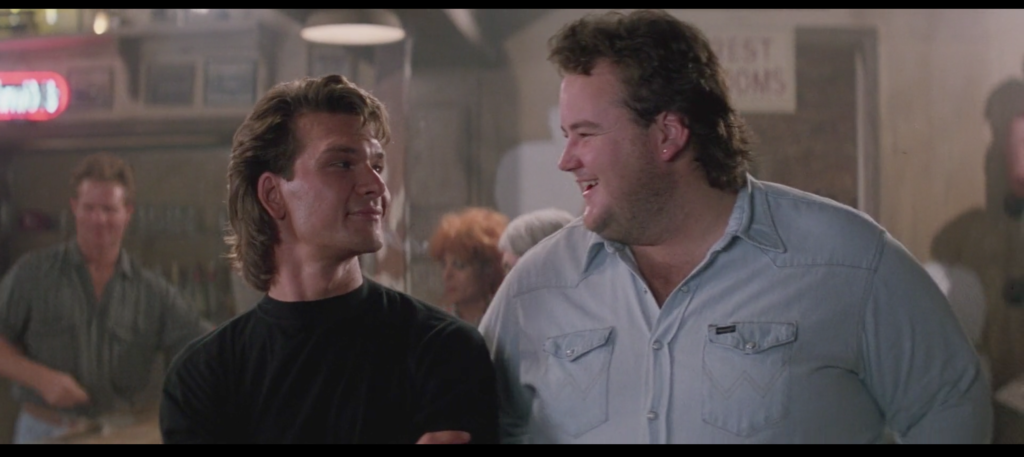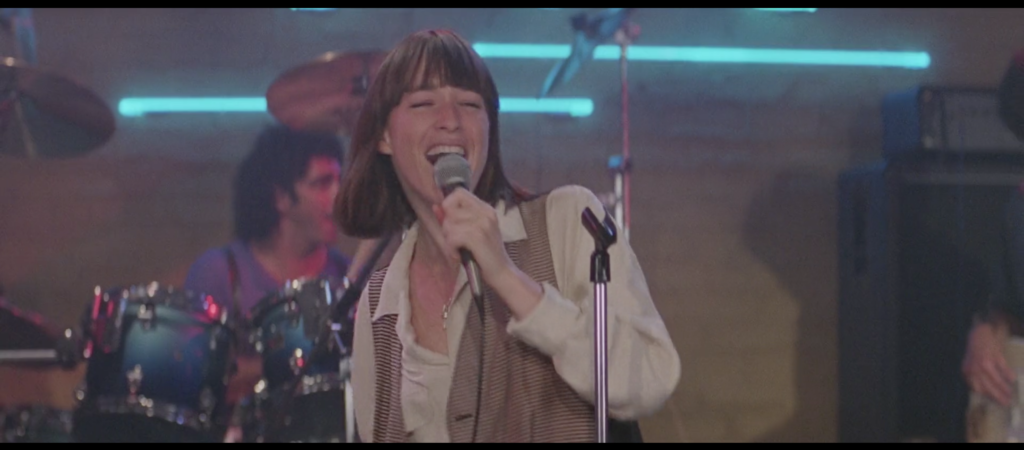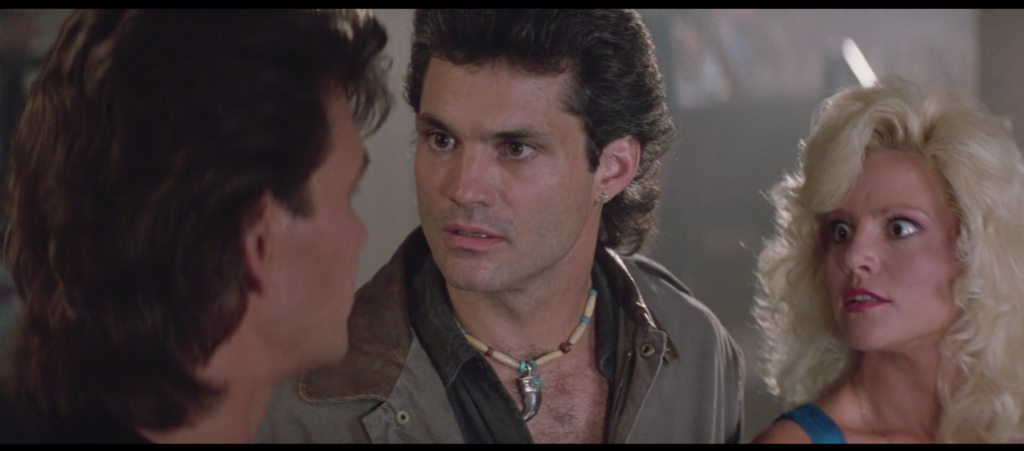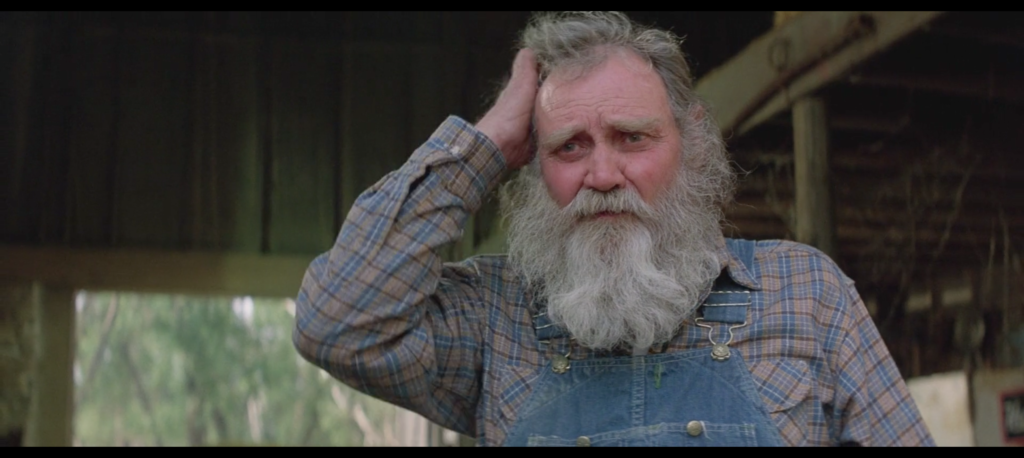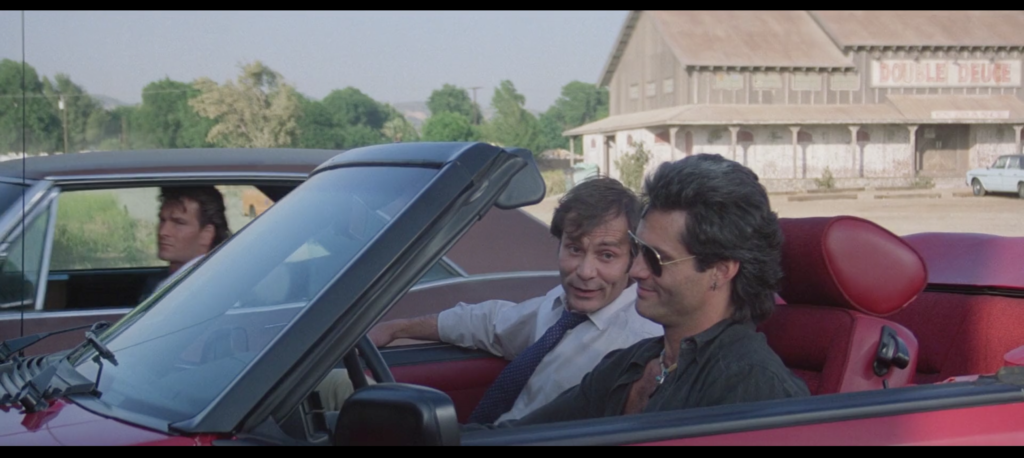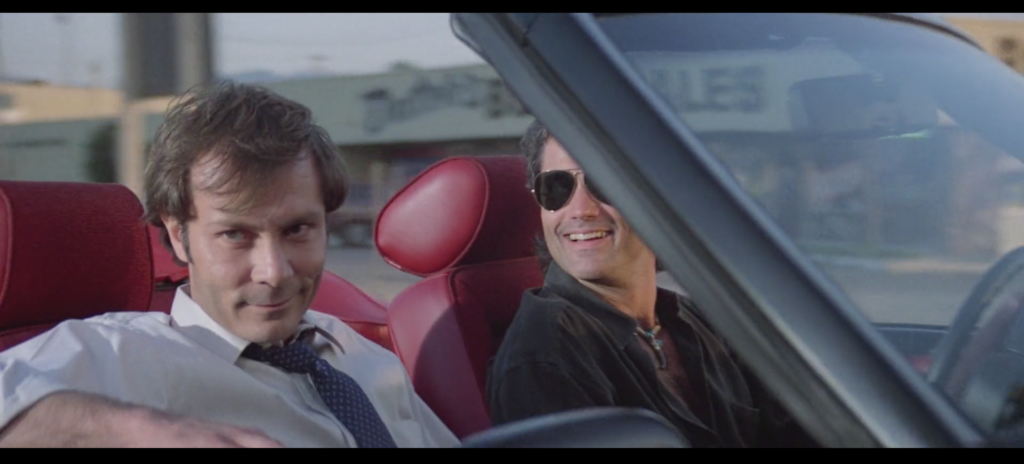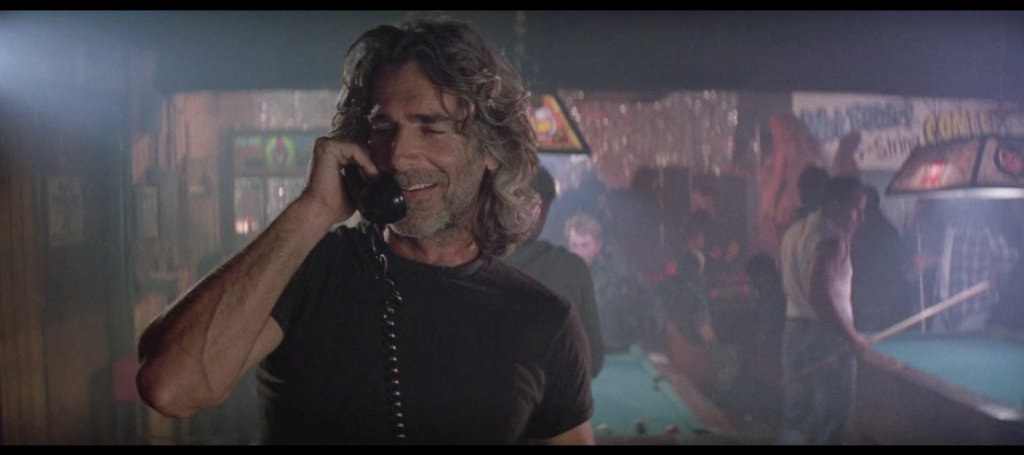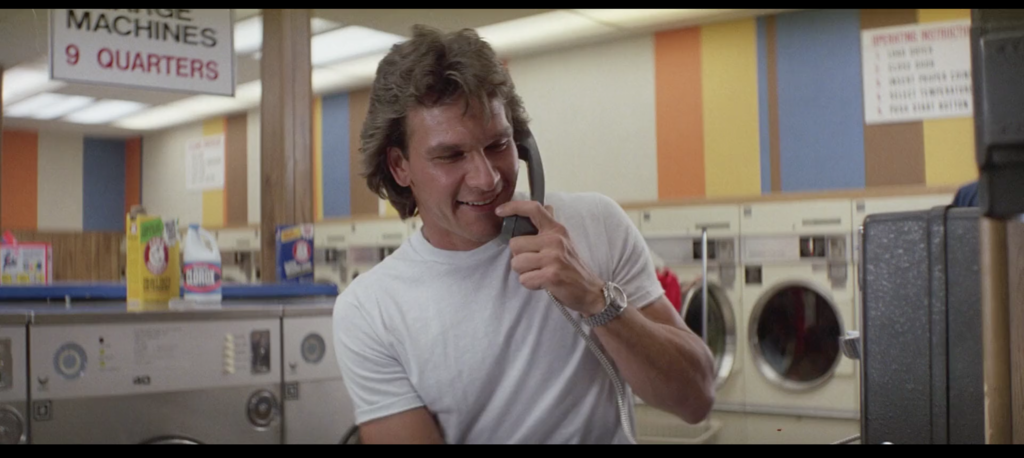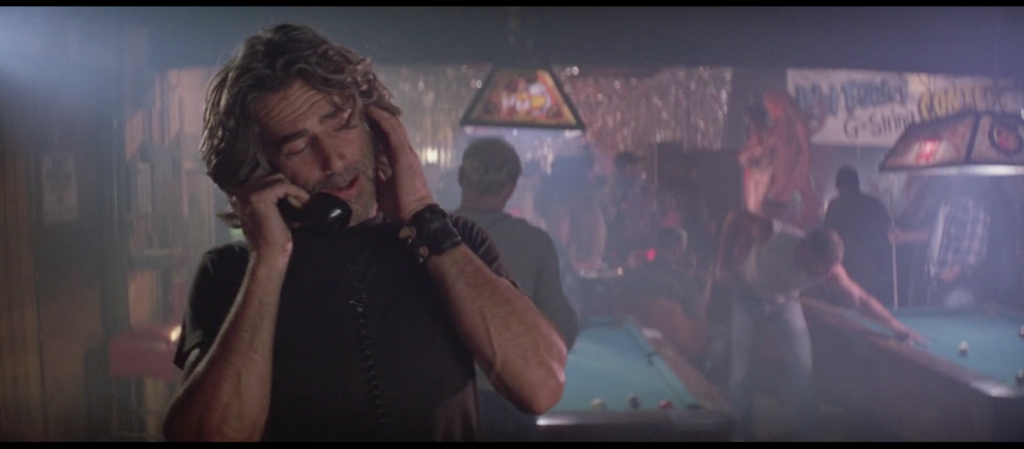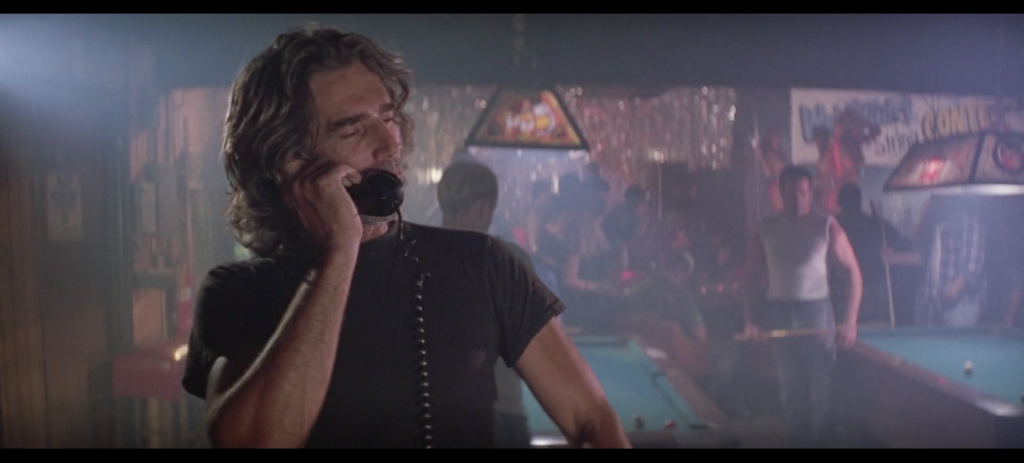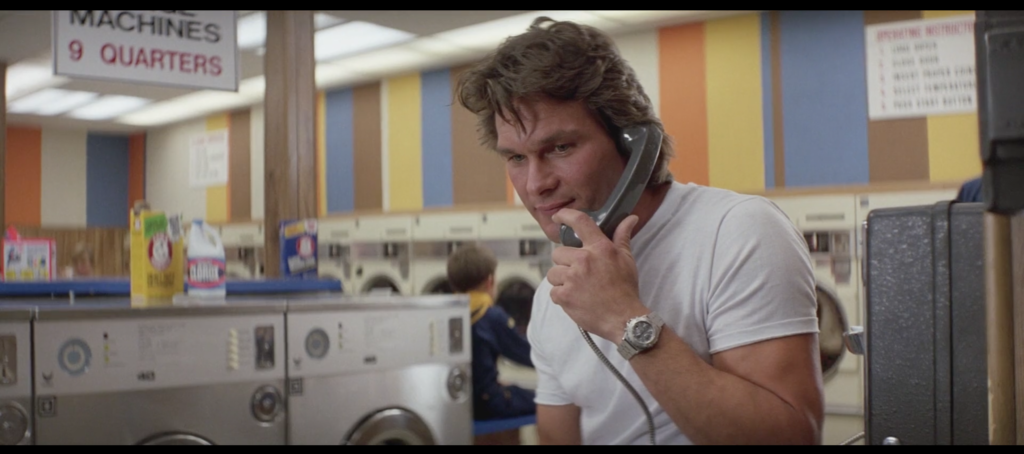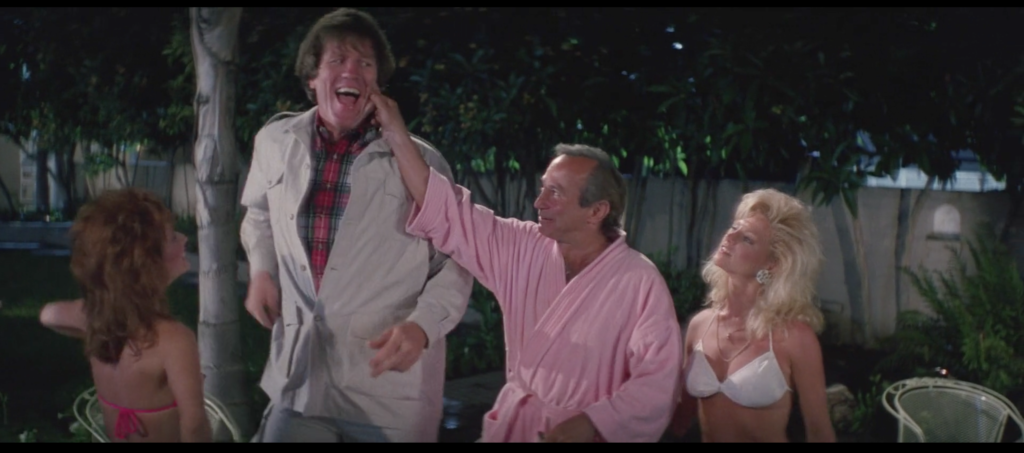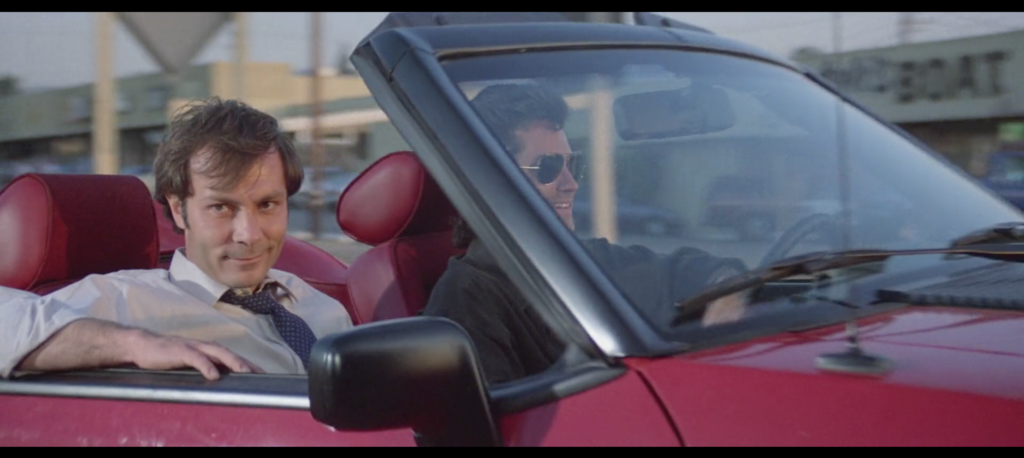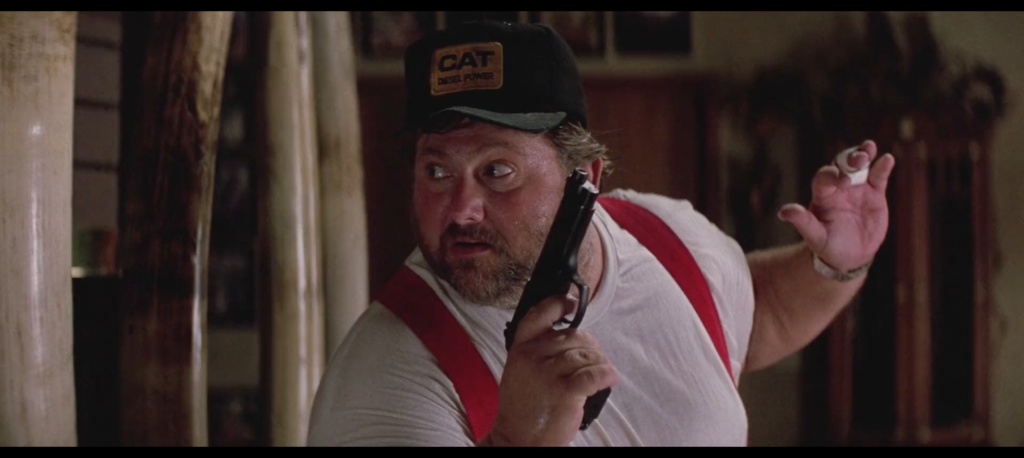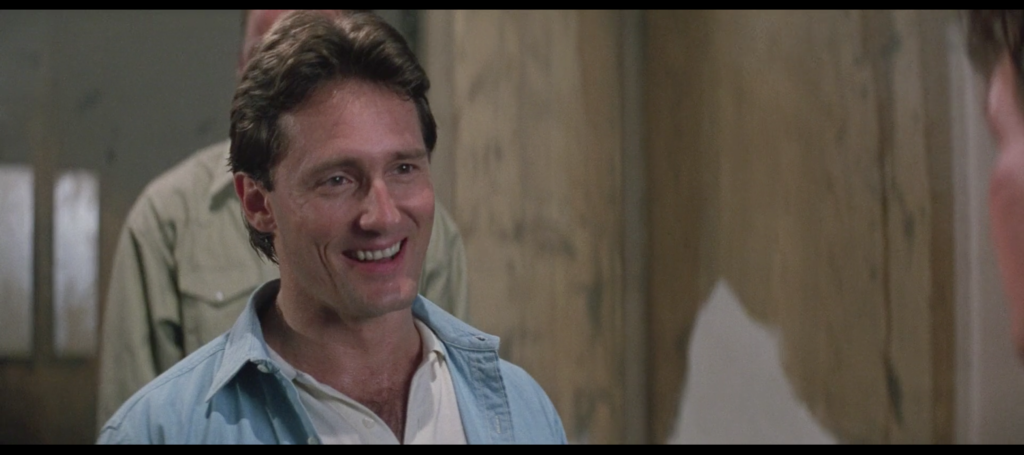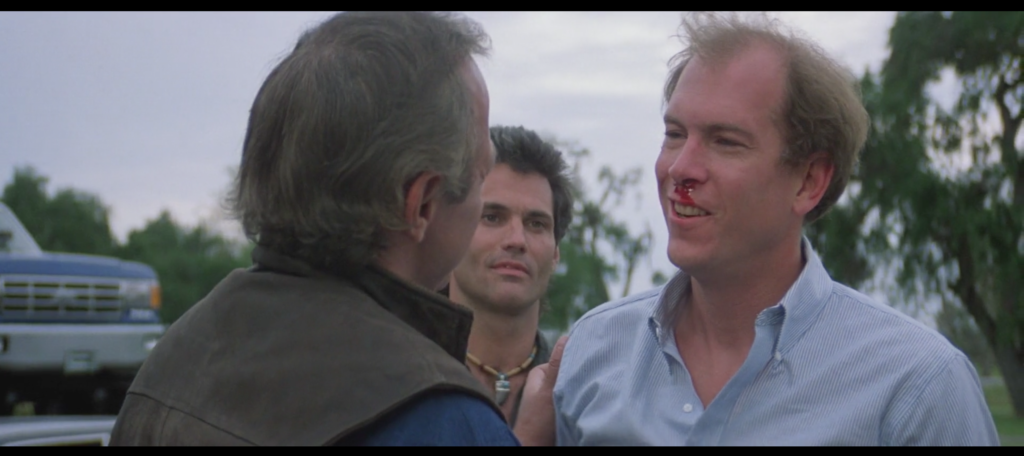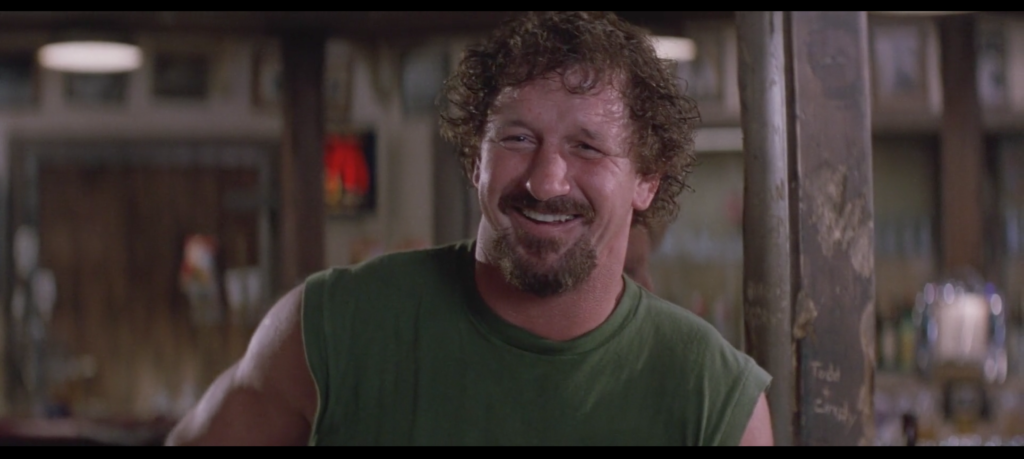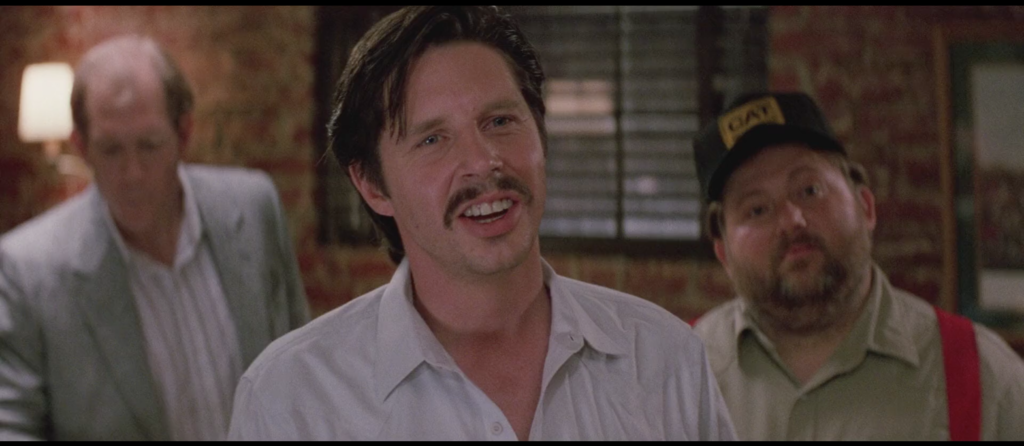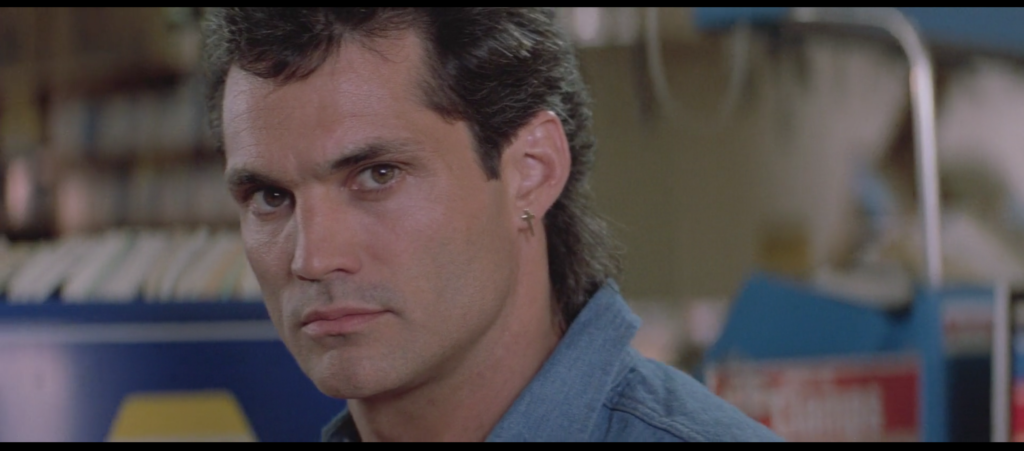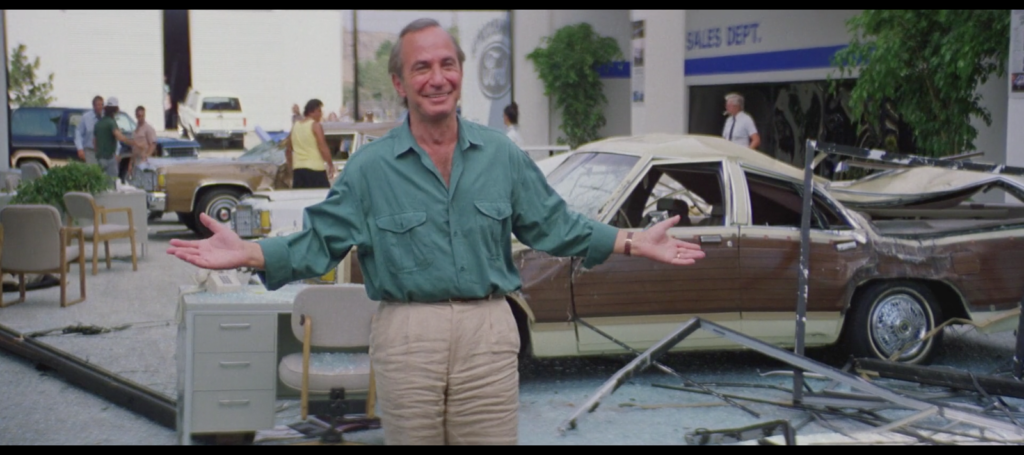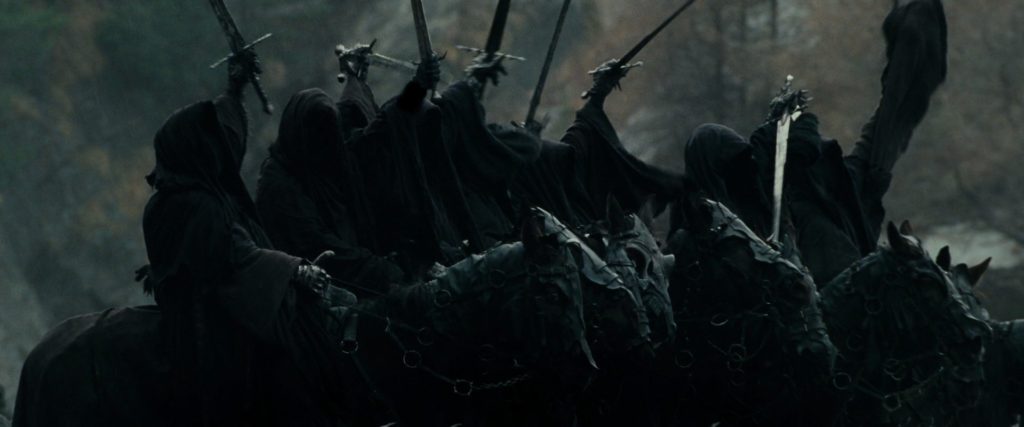Posts Tagged ‘dalton’
142. The Doctor Is In
May 22, 2019“horny” has killed more people than all the volcanos on earth combined —@dril
“I just think I’m looking at a dead man, though.” —Carrie Ann
By the standards established by these eminent students of the human condition, I would like to report at least three murders committed by Dr. Elizabeth Clay in the very first moment we see her on this fateful night. There’s the galoot in the wifebeater, Bobby Axelrod, and another guy right behind her who’s about to pay the iron price for having the best seat in the house. Worth it!
Despite being terminally horny, I don’t often write about it anymore because it seems…I dunno, both distasteful, coming from a person in my privileged position, and superfluous, since now every single human being above the age of about 16 with an Internet connection is writing things like “I want Timothee Chalamet to rip out my esophagus and toss me into a nearby body of water to float downstream face-down” every two seconds. I made an exception for Carrie Ann in what is and remains the hottest goddamned moment in any move I’ve ever seen, of course. In a more abstract way I talk about how attractive Denise and Dalton are, although Denise doesn’t hit me where I live so to speak, and I’m too tediously straight to feel legit randy towards even Patrick Swayze in his prime.
But I am unashamed to say that my first thought every time I see the Doc make her grand entrance in the middle of Dalton’s parking-lot brawl against Boot-Knife Ketchum and the Goon Guys Present The Sounds of Barbershop is a spit-take, a low whistle, that springy series of noises when a machine malfunctions in a Looney Tunes short, va-va-fucking-va-voom.
My second thought: Why is she wearing a picnic blanket, and why does her hair look like what happens when you lose the ponytail accessories for an old Barbie doll? Because man alive, that is an odd dress, and that blonde lizard frill sticks out like it broke free of her earlier French braid on its own steam. It’s wild.
It’s to the Doc’s testament that she can make it work. Her body is nearly as nuts as Dalton’s is, that much we can gather, and we’ll get a better look at it later still. Both she and Kelly Lynch, the actor who plays her, are both very pretty women, with a face that seems severe until she smiles, at which point it’s open and warm and kind of adorable. There’s a bit later in the film where Dalton razzes her and she kind of open-palm smushes his face, and that goofy sweet horseplay makes sense the moment she grins.
But the dress commands the eye in the end, and it’s what makes her entrance so striking. Even among the hooting and hollering heteros with whom I first watched the movie, the drunken “Hel-looooo nurse!“s were quickly followed by “What the hell is up with that dress?”, but you’ll notice the order of the two exclamations. When you see this extremely accomplished person—her accomplishments are all we know about her at this point—arrive in clothes that make this loud a statement, you wind up not caring much that the statement is borderline incomprehensible. You just think “How can I meet and entertain and hopefully impress this person without fucking up? She’s a surgeon in a gingham mini for chrissakes!”
Considering how badly Dalton bobbles the first date (though as it turns out he doesn’t bobble it half as badly as it seems at first blush) this appears to have been his primary response as well. It’s unnerving, I’d imagine, to have just finished kicking the asses of four men sent to murder you and then still find yourself several score professional and sartorial steps behind a person who just showed up to take you on a date. Your rules won’t help you now.
141. Dalton in repose
May 21, 2019When we find Dalton lying on his back, hands behind his head, eyes open, under a shady tree, just daydreamin’, whilin’ away the hours, conferrin’ with the flowers, consultin’ with the rain, it behooves us to review recent events in his life. In reverse order these include an astonishingly awkward first date with Dr. Elizabeth Clay, during which you’d be hard pressed to find something she said to him that wasn’t a brutal neg; a parking-lot brawl with a man with a knife in his boot, which is how Elizabeth found him when she arrived for their date; a call to his mentor Wade Garrett in which we receive the first intimations of the depths of Dalton’s concern about Brad Wesley; the discovery that Wesley and his goons are bracing local businesspeople for protection money; getting stitched up for a knife wound incurred in a previous brawl with Pat McGurn, O’Connor, and Tinker, during which process he meets Dr. Elizabeth Clay for the first time; the brawl itself, during which the knife wound is incurred. “Man, this guy has it good” is not a thought I’d have.
Yet it’s a thought radiated by every inch of his body (and magnificent hair) as he lies there on that car. A car which was destroyed—did I mention this?—by disgruntled opponents yet again, sometime between when he defeats Ketchum and the Church Elders in the parking lot and departs for his date with the Doc and when they return to the lot later that night. They pulled a stop sign out of the ground and shoved it through his front windshield, man. I’m not having much trouble reading the symbolism there, but Dalton either is having that trouble, or, and this is more likely, he’s completely untroubled by it at all. He’s gonna take five on the battered body of his car, gonna kick back on that thing and take in the fragrance of nature in the parlance of Emmett’s times like it’s a hammock. He’s living easy, loving free, season-ticket on a one-way ride, asking nothing, leave him be, taking everything in his stride.
Even when Tinker and the Bleeder show up he doesn’t so much as look their way. I’ll remind you here, in case you forgot what happened a couple of paragraphs ago, that Tinker is the man who sent him to the hospital with a knife wound, and O’Connor is the man who helped set him up for that injury. Dalton proceeded to beat the holy hell out of O’Connor while his bouncers doubled up on an immobilized Tinker like they were hitting the heavy bag. There’s no reason for Dalton not to believe these men have come to kill him, because they’ve already tried. I wouldn’t imagine blowing it has cooled their enthusiasm for the prospect.
But that’s Dalton right there, chilling TF out on a vehicle trashed by his mortal enemies, in a body also trashed by his mortal enemies, as his mortal enemies approach.
And yet they are the ones who flinch the second he moves. This despite outnumbering him. This despite being on their feet while he has to get up from a supine position. This despite the fact that, you know, the reason they’re there is to get him to get up and come with them, like him getting up and coming with them is baked right into the premise of their little errand here.
But—and I can’t believe I’m saying this given my strong anti-goon bias—goons sometimes see things the rest of us cannot. (Maybe it’s the sunglasses.) O’Connor and Tinker don’t see a man mellowing out despite all the signs surrounding him that he should not. They see a rattlesnake sunning itself on a rock. You ever seen something like that? They look pretty chill too. Pretty calm, pretty relaxed, pretty vulnerable. I’m not about to fuck with one though and neither are you, are you. We see the kinetic inherent in the potential. We remember the Good Book: The serpent is subtle.
139. Dress from an Italian Restaurant
May 19, 2019A bottle of white
A bottle of red
A smashed beer bottle on a drunk guy’s head
We’ll climb on tables with our feet
Near the chickenwire stage
You and I, filled with rage
A bottle of red
A bottle of white
Regularly scheduled thing for Saturday night
You’ll wear a tablecloth you got
From an Italian restaurant
Things were okay with me those days
I got a good job, I got out of Memphis
I fucked a dude’s wife, ripped out his windpipe
And I didn’t do time
Oh, we’d just met days ago
You’d just healed my torso
“Nobody ever wins a fight” was my pickup line
You remember those days getting nude in a refurbed barn
My enemy watched as we fucked on an old man’s farm
Oh, we didn’t bother to kiss, who needs foreplay when you’ve got charm
Cold beer, fist fights
My sweet romantic Jasper nights
Oooh, hoo
Yeah, yeah
Wooo, hoo
Ohh, ohh, ohh
Oh oh
Oh oh
Oh oh oh oh ohh
Oh oh
Oh oh
Oh oh oh oh
Dalton and Wesley were the hero and heavy
Of a film that initially bombed
Swerving around with the car top down
And tai-chi on the lawn
Nobody looked any finer
And they both put their dicks in the Doc’s vagina
But Jeff Healey knew and implied Doc was Wesley’s ex-wife
So it’s Dalton and Wesley and only one man will survive
Oh oh
Oh oh
Oh oh oh oh ohh
Oh oh
Oh oh
Oh oh oh oh
Dalton and Wesley were getting real petty
In a film in 1989
Wesley decided to cut off the Double Deuce liquor supply
Everyone said they were crazy
Wesley had goons who were much too lazy
And Dalton was dueling a guy with a boot with a knife
Oh, but there were were watching Dalton call Wade for advice
Oh oh
Oh oh
Oh oh
Well, he opted to send for his wise old mentor
Who had taught him to bounce with no fears
He’d feathered his nest where the girls shook their breasts
And drunk soldiers could ogle their rears
He was grizzled and louche and he said “Double Douche”
And his bloodstream’s primarily beers
A-whoa oh oh oh
Oh oh oh oh
Wade Garret’s old
Oh oh
Oh oh
Oh oh
Well, they fought for a while in a very nice style
But it’s always the same in the end
Wade Garrett got knifed and it cost him his life
(Though he’d shown off his pubes to his friends)
Then the old men got mad and massacred Brad
Right after Dalton killed all of his men
Oh oh oh oh
Oh oh oh oh
Dalton and Wesley had had it already
By the end of 1989
There was no way to know
We’d be watching this show
For the rest of our lives
It influenced Mystery Science
Extensively cut for network compliance
And soon was a staple of watching on cable while high
Oh, and that’s all I heard about Dalton and Wesley
One was Gazzara and one was real sweaty
And here we are waving Dalton and Wesley goodbye
Oh oh
Oh oh
Oh oh oh oh ohh
Oh oh
Oh oh
Oh oh oh oh ohh
Oh oh
Oh oh
Oh oh oh oh ohh
Yeah, yeah, yeah
A bottle of red
Ooh, a bottle of white
Whatever works so pain don’t hurt tonight
Just wear that tablecloth you got
From an Italian restaurant
136. Natural causes
May 16, 2019“How’d this happen?” Dr. Elizabeth Clay asks Dalton comma James while observing the yawning knife wound in his side. “Natural causes,” he responds, staring at her. “Looks like a knife wound,” she says skeptically, after fingering the skin around the gash; not the first doubter to touch a man’s wound. “Like I said,” he replies, handing her his medical files. (“Saves time,” you’ll recall.)
But I want you to take a good look at this shot. Look at Dalton, naked from the waist up, seated obediently as a woman touches him where he is most vulnerable. Look at the top of the head of Dr. Clay (that’s how she introduces herself, all business, appropriately), her face approaching waist level, looking intently at the liminal place where his body is extruding its vital fluid into the outside world. Look at his eyes as he looks down at her, as hungry and urgent as those of a well-trained but young and rambunctious dog eyeing a Milk-Bone.
Dr. Clay has yet to so much as meet Dalton’s gaze, intent as she is on triage. When she does finally see him, really see him, it’s through the protective panes of her enormous, almost vaudevillian eyeglasses. But Dalton has no such prophylactic barrier in place. He sees her, really sees her, right away. By this I mean he sees her ideal self: a healer, a caregiver, a person who mends bodies rather than breaking them.
“Nice place—they send a lot of business my way,” she jokes when they discuss his place of employment. “I’m hoping to change that,” he replies, with the pride of a Cub Scout telling his den mother he plans to win the Pinewood Derby. Right away he intuits that to get right with this remarkable woman he must recast himself as a healer as well, a healer of an ecosystem rather than an individual.
“All by yourself?” she responds, smiling, with the gently ribbing condescension a parent might use on a child she’s unsure will pick up on the tonal cues when that child announces his intention to rid their town of crime while tucking a towel into the back of his shirt as a cape. She sees him now, looks right into his eyes through those gigantic glasses, and finds him mildly risible, which he is.
What she’s really doing, it becomes apparent in subsequent scenes, is attempting to tuck her obvious physical attraction to this exceptionally physically attractive man back into his medical file where it belongs—a mere physical factoid, bodily trivia, like his nine staples, thirty-one broken bones, two bullet wounds, nine puncture wounds, and four stainless steel screws. And best of luck to her with that.
Yeah, natural causes are at work here, alright. Natural indeed.
132. Jack reacts
May 12, 2019Jack is Dalton’s most promising student, his protégé, the Dalton to his own Wade Garrett. He’s the quickest both physically and mentally, he sees things others do not, he is seldom far from Dalton’s side (except when duty-bound to be elsewhere of course), he shares his observations of the world and receives Dalton’s in turn. Throughout, whether with the genuine happiness of “I didn’t know she could sing!” or the shocked disbelief of “Jesus Christ!” or the exasperated incredulity of “This is a Sears credit card,” he is never less than a hundred percent open to the world and honest in his reactions to it. He moves through life the way one should, even before the Dalton Path lies before him.
But now that it does, even his wordless responses evince that same willingness to take life as it comes. Witness how he handles Dalton’s extremely utilitarian advice following the throwdown with Ketchum and the Men Who Iron Their Jeans Gang. “Give me the biggest guy in the world: You smash his knee, he’ll drop like a stone,” Dalton says, and QED. Jack, however, does not react the way one might to fighting tips, but the way one might to good old-fashioned common sense one has never had the common sense to figure out for oneself until a wiser soul relays it. His eyes widen, his head tilts, his eyebrows go up, he nods slightly, and his smile says “Huh, I’d never really thought about it that way before, but you’re right!” It’s as if Dalton just said “Don’t worry, you won’t have trouble making it to the Fotomat before closing—school’s out, so traffic’s gonna be lighter this afternoon,” or “If you tell the kid no, he’s just gonna sneak in, so at least buying him the ticket to the R-rated movie yourself keeps the lines of communication open.” “Oh yeah,” says Jack’s face, “good point!” Which it is, I suppose, if faced with a big guy and a knee. But Jack teaches us here as much as Dalton does.
131. Pain hurts
May 11, 2019“It is realistic, and we’ve been striving very hard to make it realistic. Fights aren’t pretty. You know, when somebody gets hit, it hurts, and it’s ugly, and we’ve tried to capture that.” —Rowdy Herrington
—
“I grew up in Texas—not that this is exclusive to Texas. But what is it about men having to go out to bars at night and beat somebody’s face in, or get their face beat in, and get drunk, and you know, they don’t care which it is? There’s some kind of anger or aggression in all of us that we have to find a way to vent or it’ll kill us. And that’s what intrigued me about this, because this script looked like everything I grew up with—every level of mentality that I’ve known since I was born.” —Patrick Swayze
—
“Do you ever win a fight?”
“Nobody ever wins a fight.”
—Dr. Elizabeth Clay and Dalton, Road House
130. The Third Rule, Verse 5
May 10, 2019“This is the new Double Deuce,” says Frank Tilghman. We are at the start of an all-hands staff meeting, and Tilghman is pointing to the concept art for the bar’s redesign. But standing nearby is his latest hire, Dalton. It is through Dalton, with Dalton, in Dalton that the new Double Deuce will be achieved. Dalton embodies the new Double Deuce. He is its future.
When Dalton takes over as cooler he becomes more than just the chief bouncer. His role is not to handle a series of discrete incidents, but to institute sweeping reforms that will eliminate such incidents forever. “It’s going to change,” he states—not a threat, not a promise, a fact. His bouncers, too, must change for this to take place. As below, so above.
Bouncing on the Dalton Path is a matter of following “three simple rules.”
This, for the sixth time, is the third.
3. Be nice (continued)
Previously:
- The Great Commandment
- The Parable of Someone Getting in Your Face and Calling You a Cocksucker
- Walking the Dalton Path Together
- It’s a Job / It’s Nothing Personal
Whenever two or more nouns are gathered to call a name, there is hate.This is the difficulty—well, one of the difficulties, in addition to being barred from coming within 200 yards of Jasper High—facing Steve the Horny Bouncer. He has heard Dalton’s commandment. He has heard the parable of someone getting in your face and calling you a cocksucker. He’s heard about the power of community, the innate dignity of the laborer, and the fact that it, whatever it is, is nothing personal. He simply isn’t buying it.
“Uh-huh,” he says, the sarcasm dripping from his lips in sufficient quantity to stain his shirt, were he wearing one. “Being called a cocksucker isn’t personal?” Gyp Rosetti, you have a friend in Steve.
“No,” says Dalton coolly and confidently. (Considering the degree to which men routinely sexualize their antagonism toward him, I’d say this is a man who’s been called a cocksucker many, many times.) “It’s two nouns combined to elicit a prescribed response.”
Well goddamn, looks like he was a linguistics minor in NYU! Thanks there, Chomsky!
Of course, he’s right. One need look no further than the fact that this is my 130th essay about a movie called Road House in 130 days to see that combining two nouns in the right way can elicit one hell of a prescribed response. I have chosen to give myself over to that response, but that’s just it: I made a choice. Dalton is attempting to convince the skeptical Steve that he has a choice too, and he can choose to let that shit slide.
Steve, you will not be surprised to learn, is not buying it. However, while dumb, he is no dummy. He senses he will not be able to best Dalton in the squared circle of neurolinguistic programming. Better for him to take a new and even more direct approach:
“What if somebody calls my mama a whore?”
Actor Gary Hudson’s delivery of the word “whore” is remarkable, a cousin in its way to Joe Pantoliano as Ralph Cifaretto, exasperatedly insisting “She was a hooah.” He takes the word and purses his lips and shoots it out the side of his mouth, like he’s trying to send it scurrying out of the servant’s entrance before the Duchess arrives. Nervous laughter erupts. All that his smug look of triumph afterwards lacks is the voice of Ra’s al Ghul from Batman: The Animated Series saying “Checkmate, Detective” or some shit.
Which leaves him wide open for Dalton’s riposte:
“Is she?”
Nervous laughter bubbles up again, at Steve’s expense this time. His smile sours. He takes the napkin or whatever he’s been tearing up OCD-style and tosses the latest shred to the ground in a rage. Anything he says would imply acceptance of Dalton’s framework, that rather than being some outlandish insult, the notion that Steve’s mother is a sex worker is a matter of some debate. Not since Dalton told Morgan “opinions vary” has he so thoroughly shut someone down.
Note that Dalton himself is agnostic on the issue. I’m not claiming any kind of “sex work is work” points for Dalton; this was an era in which even an NYU philosophy major may not have encountered this kind of thinking, and moreover his attitude toward Denise after her topless dance smacks of SWERFiness. And yet one is reminded, is not one, of Matthew 26:63-64: “And the high priest answered and said unto him, I adjure thee by the living God, that thou tell us whether thou be the Christ, the Son of God. Jesus saith unto him, Thou hast said.” Tou-fuckin-ché, Caiaphas.
And so it us unto you, Horny Steve. You have just given Dalton the rope to hang you with, rhetorically. When you diss Dalton, you diss yourself, and in so doing you yourself have set up the perfect demonstration of the wisdom of “Be nice.” Did Dalton say anything insulting? You’ll notice he did not! He left it to his foe to be his own undoing. Petard, here be thy hoist.
129. The Third Rule, Verse 4 Revisited
May 9, 2019“This is the new Double Deuce,” says Frank Tilghman. We are at the start of an all-hands staff meeting, and Tilghman is pointing to the concept art for the bar’s redesign. But standing nearby is his latest hire, Dalton. It is through Dalton, with Dalton, in Dalton that the new Double Deuce will be achieved. Dalton embodies the new Double Deuce. He is its future.
When Dalton takes over as cooler he becomes more than just the chief bouncer. His role is not to handle a series of discrete incidents, but to institute sweeping reforms that will eliminate such incidents forever. “It’s going to change,” he states—not a threat, not a promise, a fact. His bouncers, too, must change for this to take place. As below, so above.
Bouncing on the Dalton Path is a matter of following “three simple rules.”
This, for the fifth time, is the third.
3. Be nice (continued)
Previously:
- The Great Commandment
- The Parable of Someone Getting in Your Face and Calling You a Cocksucker
- Walking the Dalton Path Together
- It’s Nothing Personal
But there’s more to Verse 4, isn’t there? Dalton doesn’t merely tell his acolytes that bouncing is nothing personal. He chooses to emphasize that bouncing is a job. Bouncing is work. Bouncing is labor. Through this lens, perhaps, we can arrive at the cod Marxism for which Road House has been crying out for years.
We’ve discussed one interpretation of the latter portion of this verse already—the need to maintain a level head, a distanced perspective, the ability to distinguish between professional challenges to be surmounted and personalized challenges to be destroyed.
At this point Dalton could, and indeed at a subsequent point he will, emphasize the “sticks and stones may break my bones” element. He could, and will, insist that though they will be dealing with physically and verbally aggressive patrons, those patrons have no insight into the men bouncing them and thus their words and deeds carry no true weight. That’s one interpretation of “it’s nothing personal,” and it’s valid.
But what does Dalton mean by counterposing “it’s nothing personal” with “it’s a job”? By situating bouncing within the context of labor and setting this up in opposition to the personal, he is underlining—and not for the first time—the communal nature of the task. The bourgeois conception of personhood, atomic individualism, false individual consciousness, Thatcher proclaiming “there is no such thing as society”: These have no place Dalton’s philosophy. When you do a job you do so in concert with your fellow workers, and, ideally, for the benefit of workers as a class.
You are no Morgan, searching for opportunities in which to vent your rage and exercise power at the expensive of the collective.
You are no Pat, enriching yourself at your fellows’ expense.
You are no Steve, fucking young women of uncertain age in the breakroom, or Judy, selling cocaine in the bathroom, indulging in hedonistic pursuits while others shoulder your burden.
“You are the bouncers,” Dalton says at the end of the Giving of the Rules. You are the proletariat. Through your labor the value of the Double Deuce is derived, a fact which is made plainer and plainer as the film goes on.
“I am the cooler.” Dalton is the vanguard. He seizes power with the intent of awakening the wider class of bouncers to their revolutionary potential and diffusing that power among them, and unlike other vanguardist movements he does so.
“Watch my back and each other’s.” Solidarity forever.
“Take out the trash.” Up against the wall, motherfuckers.
128. “You’re too stupid to have a good time!”
May 8, 2019When Ketchum and the boys from the Tuesday night Good Book, Good Burgers combination Bible study & barbecue men’s meeting show up to kick-stab Dalton in the skull for the crime of firing Brad Wesley’s nephew and then beating him and his buddies up after they attempt to stab Dalton in the face and torso over it, Dalton is ready. Arrayed Avengers-style, he and the other bouncers tell the new visitors that the Double Deuce is closed. You’ve got to get up pretty early in the morning to fool Ketchum, however, who notes that the bar is full of people and demands to know what they’re doing. Dalton merely points out the obvious, which is that they’re “drinking and having a good time.”
“Well, that’s why we’re here,” says Ketchum, grinning, before whipping his leg straight up in the air to enziguri Dalton…with extreme prejudice.
Alas for the goon! Dalton is quicker of reflex than his assailant, which he demonstrates by catching Ketchum’s leg in midair. But he is also quicker of wit, which he demonstrates with a first-ballot Hall of Fame Road House one-liner: “You’re too stupid to have a good time!”
Dalton proceeds to QED Ketchum’s ass by dragging him into the parking lot and whipping him and his buddies but good. All is well, one would think.
But one would be wrong. Just over two weeks into this project we discussed The Shirtless Man. Much like the Green Man, the woodwose, or Dionysian mystery cults, this figure of fertility and abandon is, along with his demonic/cthonic opposite number Morgan, our introduction to the world of the Double Deuce. I won’t insult your intelligence by belaboring a point you can grasp with your own two eyes immediately: The Shirtless Man is extremely stupid, and he’s having the time of his life. Indeed much of the clientele of the bar when Dalton arrives to work there—the very same people Dalton is intent upon clearing out—are both as dumb as pillowcase full of doorknobs and as happy as pigs in shit. There’s no other way to put it: Dalton is wrong.
But in this rare instance, Dalton’s maxim reflects the world not as it is, but as he is determined to make it be. His task here is not to fix something broken according to the ways of the Dalton Path, but to break something intact so that the Dalton Path may proceed. He is changing the pig himself this time, creating the conditions under which “You’re too stupid to have a good time” is true. The Three Simple Rules, “Pain don’t hurt,” and the like are matters of observation; “You’re too stupid to have a good time” is a matter of application.
In short, we have reached the start of the Dalton Path’s rockiest stretch, and we will see Dalton pushed to the breaking point as a result before he emerges stronger on the other side. We are privy to a great becoming.
127. Earth-Denise
May 7, 2019I think it’s only natural to look at this image of Dalton and Denise, Denise sidling up to Dalton to cheerfully and in fact thoughtfully proposition him for sex and Dalton preparing to rebuff her pretty much no matter what she says, and focus on the hair. Those two glorious manes, brown and blonde, male and female, yin and yang, equal and opposite, an Aqua Net Argonath. Do they not suit each other, complement each other, mirror each other? By the end of this film you’ve seen both of these people mostly naked and once you cross that threshold—well, brother, we’re all adults here, and given what’s gone on in the back room of the Double Deuce already I don’t see the percentage in beating around the bush—you want to see these two people fuck. I sure do!
But I want more.
Oh, things work out fine in the Dalton/Doc timeline, for sure. Not for Denise, who gets beaten by Brad Wesley and then does an aggressive striptease on his behalf and then gets ridiculed by Dalton and dragged away and never seen again. And of course not for Brad Wesley and his men, who all get murdered, so hey, maybe things work out fine for Denise after all. But for Dalton and Elizabeth, you know, they find true love, Dalton turns a personal corner and quits cutting and running and gets over his guilt and trauma from the last time he murdered a guy, they have a bunch of no-nonsense sex in there somewhere, the Double Deuce and Jasper are freed from the tyranny of Brad Wesley, and regardless of where you come down on Frank Tilghman the movie implies this is a good thing so let’s go with that.
But sometimes I imagine another world. In this world Dalton does go back to Denise’s place and fucks, it doesn’t kill him, he does even like it. First of all kudos to Denise for maintaining her own apartment or whatever, maybe she and the girls are roommates, it’s a fun situation like Sarah Connor and whatsername at the beginning of The Terminator, just independent women of the ’80s living their dreams, there’s a lot of snickering and giggling when Dalton and Denise offer perfunctory greetings to them while they watch The Golden Girls and then fall into her room together. Second maybe it accelerates the timeline vis a vis Jimmy, Wesley’s top goon and illegitimate son (source for this claim?), who tells Dalton to say Goodnight, Denise. Maybe Dalton actually does say “Goodnight, Denise” in response and it really humiliates and angers Jimmy the way Dalton’s mildest comebacks seem to snap the likes of Morgan and Steve like dry twigs, and so Jimmy participates in the fight that follows with Ketchum and the anonymous goons who look like they’re dressed for Sunday services at a midwestern evangelical church. Maybe this fight is a real backbreaker for Dalton and Jack and Hank and Younger now because it’s five on four and at least two of the participants are pretty dece at fighting or would be if Dalton hadn’t yanked one’s boot off and twisted his ankle and hauled him into the parking lot like a sack of potatoes, but regardless we later see Jimmy beat Jack and Hank and Younger and damn near Wade and Dalton too before Wesley calls it off, so it could get rough. And let’s say Denise finds that boot with the knife in it that Dalton threw, technically we never see where it lands, and she sneaks up behind Jimmy as he’s about to deliver the coup de grace on Dalton and just fucking brains him with it, you see the lights go out right in front of you, it’s kind of horrifying but this abusive psychopath had it coming. And the rest of the goons fuck right off and yes I’m sure Wesley would go absolutely ape shit considering his bastard (?) just got done by his girlfriend, but guess what Brad? She’s not your girlfriend anymore, nope, she’s busy having Dr. Elizabeth Clay who showed up just in time to watch Dalton fall into the arms of another woman treat his wounds. And it’s a touchy thing for a while, what with the police in Wesley’s pocket and now there’s kind of a love triangle developing, and Brad’s acting rashly now, he’s not timing the explosives right for Emmett and Red because it’s like Tinker or O’Connor placing them rather than Jimmy and for all I know maybe Strodenmire gets run over along with his car dealership this time because Ketchum can’t sleep because all he can see is Jimmy’s vacant eyes with his boot embedded in his brain and he’s doesn’t give a fuck who gets hurt anymore because it’s hard to feel anything. But who should ride into town to help Dalton put down this pack of mad dogs but Wade Garrett, just like he always has, and even if Red and Emmett and Pete are all dead this time around there’s still Wade to pull the trigger and save his mijo from becoming what he’s always dreaded, he’ll be his sin-eater and that’s fine, and the Double Deuce will be fine, and Jasper will be fine, and yes Wade comes on to Denise pretty heavy but wouldn’t you know it, this time around Dr. Elizabeth Clay is not spoken for, and the red fucking hot sexual chemistry between the two of them combusts and they’re fucking before you know it, everyone’s fucking up against walls, left and right, like rabbits, because death’s thick in the air, it’s in their brains like a disease, and this is how you treat it, this is palliative care because you need love to feel alive, don’t you, you need to have love and make love to show death it hasn’t fucking gotten you yet, and Dalton and Denise who escaped her abusers and Wade and Elizabeth who escaped that abuser before are still alive and they say as they fuck and love each other goddammit we still have time on this earth and we’re going to live, live, live, live, live, live, live, live, live.
125. “I didn’t know she could sing!”
May 5, 2019If this configuration of Dalton and his padawan-learner Jack looks familiar, it’s because we’ve been here before. The exchange and fight scene that are about to occur are perhaps the purest distillation of the Dalton Path in the entire film, following the Three Simple Rules and their various chapters and verses to the letter. As a bonus they show the primacy and utility of Jack among the Double Deuce’s other bouncers. It is Jack, after all, to whom Dalton relays the Riddle of the Right Boot, counting on the younger man to solve it. When they move on the intruders who’ve come to the bar to murder a man by kicking him in the head with a boot-mounted knife on account of the fact that he fired a rich guy’s nephew, they move as one.
But how did they arrive at this point? By what strange magic were Dalton and Jack united at this moment? The magic…of rock.
Specifically Carrie Ann’s variant thereof. The big-grinned barmaid with the bangs has traditionally occupied a privileged position in Dalton’s orbit. It is she to whom he first entrusts the secret of his name. It is she who preaches his name to the other barfolk. It is she who is granted a glimpse of the ass.
Now that the Double Deuce has been cleaned up, it is she who takes the stage to demonstrate this fact to the viewer. Would any woman have been caught dead on the stage of the old Double Deuce, where the only thing separating you from the ravening hordes, whose attention is drawn to and focused on that stage in a way no other staffer or patron can claim, was a thin chickenwire line? To be honest, dead might be the only way a woman would get caught on that thing. Putting a blind guy up there strikes me as some kind of ADA violation as it is.
But now things are different. How different? Different enough that a server is up there singing her gorgeous, joyful heart out. (Kathleen Wilhoite is truly one of this movie’s MVPs; I have no doubt from the way she shakes and grooves and grins and at one point even puts her hand to her face like “holy shit I can’t believe this!” is a sign of completely sincere pleasure on the part of the actor herself.) A few weeks earlier she had to save all her vocal power for yelling “BASTARD!” at people she’d just brained with a beer bottle in a barfight. Now she’s singing Eddie Floyd with the Jeff Healey Band.
That’s why Jack drifts over to Dalton that night: Just to smile with delight and say “I didn’t know she could sing!” He’s so happy in that moment, so happy to see someone he thought he knew reveal a new and exciting side of herself, so happy to know that as a bouncer on the Dalton Path he helped make that happen. It’s his desire to share that happiness that puts him by Dalton’s side when Ketchum strides in, anonymous minions by his side, to try to kickstab Dalton in the skull. The right place at the right time, that time being “time to not be nice.”
Call it a coincidence if you want, or even synchronicity. I call it the ne plus ultra illustration of the Third Rule, and of how the obervance of that rule yields dividends none could predict. Be Nice, commands Dalton. So mote it be.
124. Say Goodnight Denise
May 4, 2019We’re near the midpoint of the movie now and things have turned around for the Double Deuce. The thugs, thieves, dope dealers, and dudes who fuck high-schoolers have been purged—and that’s just from the staff. The bad element in the crowd has had its proverbial face smashed through the metaphorical table. The first attempt by the Brad Wesley organization to re-exert control by forcing the rehiring of sister-son Pat McGurn ended in a defeat so humiliating that Wesley beat up one of the already beaten men himself upon hearing about it. Carrie Ann has gone from getting groped and forced into fistfights to getting on stage and banging out blue-eyed soul versions of “Knock on Wood” with the Jeff Healey Band. There’s a neon sign now. The floor and walls are clean of dirt and graffiti. The dance floor is jumping. The damned chickenwire is down. It’s a new day.
Denise must agree. Not that we know her name is Denise at this point. She’s just the vivacious blonde with a sense of style who rebuffed a dude who asked her to get “nipple to nipple” a while back, and who looks at Dalton like J. Wellington Wimpy looks at hamburgers. Today is the day she makes her move.
No bizarre “nipple to nipple” euphemisms that are actually filthier than the real thing for Denise, oh no. Gliding over to Dalton’s usual post-up spot near the bar, she gets, well, nipple to nipple with him, rubs his shoulder, asks him why he avoids eye contact with her (“I’m shy”), and says “Would you be shocked if I said ‘Let’s go to my place and fuck’? Ain’t gonna kill you. You know, you might even like it.” Show me the lie, you know?
Dalton, who has an inscrutable but distinct sense of decorum that I’m still puzzling out 124 days into writing about him, seems unimpressed (or blind) and unlikely to accept the offer. But the matter is taken out of his hands. Appearing from out of nowhere, Brad Wesley’s chief goon Jimmy violently grabs Denise by the arm. Whipping her behind him and thrusting himself into Dalton’s face, he growls “Say goodnight, Denise,” and they leave.
But he doesn’t say “Say goodnight, Denise” while looking at Denise. He says “Say goodnight, Denise” while looking at Dalton, and I mean looking at him, staring right into his eyes like he’s trying to psychically bore two holes through his skull. He says “Say goodnight, Denise” as if he’s telling Dalton “Say ‘Goodnight, Denise.'”
Given Dalton’s penchant for cheap sarcasm when the opportunity presents itself, and given Road House‘s penchant for dumb jokes whether the opportunity presents itself or not, it’s hard to believe, but no, Dalton does not stare right back into Jimmy’s face and say “Goodnight, Denise.” But their loss is your gain. You can be Dalton’s voice in this moment. You can say “Goodnight, Denise.” Your quick wit will delight all who have the pleasure of your company. Goodnight, Denise.
122. A look of concern
May 2, 2019This is Emmett. Emmett has just made two discoveries that, from the looks of it, have shaken him to his core. That Brad Wesley plans to send men to the Double Deuce to physically intimidate his tenant Dalton and his friend (?) Frank Tilghman? No. That Brad Wesley plans to send men to his own cabin to plant explosives that will blow it up while he’s asleep one night? No. That sales at the new JC Penney (Opening Fall 1989!) will require a loyalty oath to Brad Wesley for eligibility? No. He has discovered that Dalton drives a Mercedes-Benz, and that Dalton is doing tai chi with his shirt off.
I’ve thought a lot about this look of utter, almost abject confusion and dismay since I first saw the movie, during which screening a friend MST3K’d the bit where Emmett lifts up a tarp in the barn and discovers Dalton’s Benz by hollering in Emmett’s hee-haw voice “THIS BOY’S FROM THE FUTURE!” Time travel is indeed one of the few exigencies I’d deem capable of occasioning that kind of blind pigfuck panic in a man of Emmett’s age, experience, and Show Me State sangfroid. (Seriously, when Dalton asks him if he’s okay after rescuing him from his recently detonated, still burning shack, Emmett replies “I’d be fine if you get off of me.” Always with the wisecracks, this one!)
Is he upset because Dalton is rich? Like, are we to believe that his whole schtick about only charging a hundred bucks a month in rent isn’t because he doesn’t care about money, but that this was just his polite way of letting a man he didn’t think could afford anything more off the hook? Does he feel bamboozled because Dalton drove up looking for a place to rent in the beater he bought at Big “T”‘ Auto Sales instead of this luxury piece of German engineering? (Does Emmett know Big “T,” while we’re on the subject? Is Big “T” part of the Jasper Improvement Society? Is Big “T” related to Pete Strodenmire, his fellow walrus-faced car salesman? Down this road lies madness, so we head back.)
Is he upset because he believes Dalton may practice “alternative lifestyles”? He’s city folk, that much Emmett could tell from the car’s New York plates. He’s pretty, and he’s got that hair. He’s writing around with no shirt, unless you count a fine sheen of oil and sweat as a shirt, which in the case of Dalton perhaps you should. His pants are mighty snug. And he’s performing some kind of Eastern dance ritual. Is the idea that Emmett’s iconoclasm regarding the local Presbyterians is a front and he actually is more on board with down-home American values than he lets on? Or is he a New Atheist?
The simplest answer, I think, is the question we’ve been asking on and off for three months now. What kind of man works as a bouncer and lives in a barn but also drives a Mercedes and practices martial-arts meditation? Shirtless, at that?
The other answer I’ve come up with is that he’s mistaken tai chi for karate and, between that and the Benz, believes Dalton to be an agent of the Axis. I mean, you’d look worried too.
120. Life Is Good, or The Apotheosis of Karpis
April 30, 2019For the past week I’ve chronicled sixty seconds in the lives of Mr. Wade Garret and Dr. James Dalton. (For the purposes of this conversation I’m assuming his degree in philosophy from NYU was a Ph.D.) During this pivotal minute, Dalton calls his old friend and mentor Wade to ask if he’s heard anything about a guy by the name of Brad Wesley. At this point, friends, you and I have talked about Dalton’s initial encounters with the richest man in Jasper: watching him buzz Emmett’s horse corral with his helicopter, swerving out of the way as he sings doo-wop while driving into oncoming traffic, shaking hands and having a brief conversation at Red Webster’s auto parts store, beating the shit out of several of his minions after they try to stab him to death in an attempt to make the Double Deuce re-hire a bartender. I’d say he’s handled all this rather well. What, you might be wondering, occasioned his call for counsel?
These happy assholes.
Dalton catches two of Brad Wesley’s premier goons, Jimmy and Karpis, just as they pull out of Red’s parking lot. Karpis, whom we see exiting the store, has just busted the place up, spilling various motor oils and antifreezes and whatnot all over the place as punishment for Red’s recalcitrance in paying his full “contribution” to the Jasper Improvement Society, the legal name of Wesley’s protection racket.
“Work ain’t work when you’re havin’ fun,” Jimmy says from behind the wheel of the getaway car as Karpis hops in after doing the deed.
“Life is good,” Karpis confirms.
And like that—poof—he’s gone.
One last, lingering, smoldering staredown at Dalton later, Karpis is driven away from the store and right out of the movie, forever. It’s the last we see of him, much to my chagrin, handsome devil that he is.
But oh, his legacy! What Karpis does this day puts Dalton and Wade on a collision course with Jimmy and Wesley, their opposite numbers. The explosion that results, which includes multiple literal explosions, will leave three of those four men dead, and change the face of Jasper forever. And Karpis’s mesmerizing face that sets it all in motion. In that Cheshire Cat grin, I see the future: Life is good, but all men must die.
119. Reach out and touch someone
April 29, 2019We joke here at Pain Don’t Hurt. We do. And we laugh, don’t we? We laugh, and we kid. We kid the movie. But I have not decided to spend three hundred sixty-five days of my life—a significant fraction of my life no matter how long I live, a fraction my kids can mention at my funeral for some chuckles—to write about a film I find funny on account of it’s impossible to recognize myself in it. On the contrary. As I’ve said in the past, Road House endears itself to me. Dalton endears itself to me. Patrick Swayze endears himself to me. I like these people, and I like the way they enact…I dunno, the things that people care about. They like to drink and dance and sing and fuck. They have to navigate moving to a new town, meeting new people, taking a new job. They keep in touch with friends. They try to fight against assholes who are ruining it for everyone. Does it matter that they get paid six-figure salaries to toss professional wrestlers out of a bar with a dirt parking lot? Only insofar as that makes it funny. There has to be something underneath to be made funny if the thing’s worth writing about it all.
This is my seventh consecutive day writing about a phone call between Dalton and Wade Garrett that lasts for one minute, to the second depending on what you count as the start or finish. It’s a funny conversation because Sam Elliott pronounces things in an unusual way, because there’s a continuity error I can spin into a CLUE, because at times it seems to undermine the system of bar-fame upon which the rest of the movie depends, because Wade calls Dalton mijo and thus invites an entire range of gutter-minded speculation.
But as Wade’s mile-wide grin when he hears who’s on the phone shows us, these men are friends, and their friendship is, I think, why I’ve gotten stuck on this single minute of film for an entire week. The friendship is what makes it a rich text, not just something you can say a lot of silly shit about. It’s the reason I like it, because it makes me like the men involved.
Wade, for instance. Wade characterizes his current place of work as such a haven for drooling cretins that “This place has a sign over the urinal that says ‘Don’t Eat the Big White Mint.'” Yet earlier—less than a minute earlier, since the whole conversation is over and done in sixty seconds—he tells Dalton that he’s in hog heaven, that “If I was doin’ any better I couldn’t live with myself.” His smile hear shows that he means it: He is thrilled to be working in a place this skeevy and dumb, where the troops charge the stage with water guns and the topless dancers flash him looks of gratitude and attraction along with everything else they flash. He doesn’t need to explain away the apparent contradiction to Dalton, his pal and confidant. He knows the kid’ll understand.
Dalton, then. Dalton seems more at home during his conversation with Wade than at any other point in the film so far other than his chat with Cody, and for the same reason: He’s not trying to impress or intimidate Wade, because Wade is his friend. Moreover, he’s not exhausted, or wounded, or trying to kick someone’s ass. His affect is genial, maybe ever so slightly deferential, the way you sound when you’re talking to a friend you haven’t seen in a while, and you’re just grateful to bask in their presence, so grateful you feel you owe them just the tiniest amount of subordination to whatever would make them happy in the moment. When Wade asks if he’s in any kind of trouble, Dalton tells him it’s nothing he’s not used to; as he does so he kind of tosses his hand up and then down in a hurry, a nervous “aw it’s nothin'” gesture that’s extraordinarily adorable. So is the uncontrollable tinge of chuckle that bubbles up as he says “But it’s amazing what you can used to, isn’t it?” He’s tickled by this, and tickled by his ability to express that feeling, and—again—confident that his friend won’t need this explained, that he’ll just get it. Indeed this occasions the “don’t eat the big white mint” gag, at which Dalton laughs gladly. Just a few seconds earlier he was nervously bringing up the Brad Wesley situation; he’s now able to very sincerely laugh at a very dumb joke simply because Wade’s the one who told it to him.
That Sam Elliott is good in this scene is obvious. He’s playing a sexy funny rough-and-tumble super-bouncer, he sounds like Sam Elliott, he nails it. That Patrick Swayze is good in this scene is crucial. It’s one I’d point people to in order to explain why he and Dalton are so appealing in this picture. There’s an ease to what he does here, a feeling like somewhere out in the multiverse there exists a Patrick Swayze who looks and acts and behaves in this exact way, and they simply traded places for a bit so they could make this movie. “What does this action hero sound like when he calls up one of his buddies” is not a question that gets asked very often, much less answered, much less answered with such charm, and since it’s Patrick Swayze we’re looking at, such beauty.
You leave this phonecall thinking Wade Garrett’s someone you wanna hear some stories from. You leave thinking Dalton’s a guy it’d be fun to grab a beer and shoot the shit with, maybe get a little philosophical in (“It’s amazing what you can get used to”) in the process. You leave thinking these guys are friends. They’re my friends too.
118. Aw Shit Hell Kid
April 28, 2019I hate to do this to Terry Funk of all people—it’s still real to me, dammit!—but Sam Elliott is here to take the Mispronunciation Title right out of his hands. Watching and hearing Wade Garrett talk to Dalton is fascinating for at least six posts’ worth of reasons, but the adventure of listening to him go to work on the English language is right there at the top. When Dalton asks him how he’s doing, he replies “Aw Shit Hell Kid I’m in Hog Heaven,” and it sounds like it reads there—like he’s reciting a song title he’s never come across before but thinks is pretty funny now that he’s seeing it for the first time. He closes out the call by telling Dalton “I’ll see ya later,” but not as one sentence, no, that would be the easy way out, and Wade Garrett is made of sterner stuff. “I’ll see ya,” he says, then pauses, then adds, “Later.” I’ve told people “See ya,” and I’ve told people “Later,” but never have I done so back to back. No one has done so back to back, until now. Sam Elliott decided he was gonna have some fun with the line “I’ll see ya later” and Rowdy Herrington had the good sense to let him, just as he did when Terry Funk got creative with “You’re a dead man.” People talk about Scorsese and De Niro and “You talkin’ to me?” or the tears in rain speech from Blade Runner, but real heads know.
117. Smile
April 27, 2019They say a picture is worth a thousand words, a principle I attempt to disprove on a daily basis. But they’ve got me here, man. Wade Garrett may be getting old, this we know, but Wade Garrett’s the best. Indeed, based on our observations thus far, Wade Garrett is a supreme hardcase. In the past minute we’ve seen him a) observe the strip club from his perch at the periphery, like Batman surveying Gotham from the top of the cathedral at the start of a night’s work; c) wrangle a horned-up jarhead in the process of charging the stage to squirt women’s breasts with a battery-operated water gun at point blank range; d) do so so convincingly that the randyman’s brother Marines all squirt him with their water guns instead of teaming up to pound the shit out of a wiry old man who just stepped to them in front of attractive women they’re there to impress; e) earn a wink-and-a-promise from the lovely young woman whose performance he saved f) return that wink with a smile for which the phrase “panty-dropping” was invented g) do all this with a pronounced limp that makes him look like he just got off his horse after riding here all the way from Cheyenne with the law on his trail. Then he hears Dalton’s on the phone for him, and this goofy-ass grin is the result. I want you to keep this smile in mind as the rest of the film unfolds. Carry it with you during the trials and travails, triumphs and tragedies, strange pronunciations and displays of pubic hair that Wade and Dalton experience together in the days to come. Dalton lights up Wade Garrett’s life. And that’s all you need to know, son.
115. Mijo
April 25, 2019“What’s goin’ on, mijo?”
This is how Wade Garrett opens his phone conversation with Dalton, the first exchange the student and the master have in the film. Mijo is the term of endearment with which Wade refers to Dalton throughout the film. Mijo means “son.”
I wouldn’t read too much into that if hahahaha just kidding, boy oh boy is this a fecund (virile?) word choice! This kind of affectionate diminutive is of course common to men of a certain age when addressing younger men. It’s certainly common in Road House. O’Connor, the Bleeder himself, calls Dalton “son” prior to this exchange. Brad Wesley refers to the men he pays to beat people and destroy property for him as “my boys.” On the flip side, Morgan sneeringly calls Wade “Dad” when they jump ugly upon Wade’s arrival in Jasper. Fatherless sons and sonless fathers in this movie, almost to a man.
Let’s step back for a moment though. Whatever the implication of the term, Road House is emphatically not some sort of prophetic look at the future of nerd culture, in which daddy issues are the prime motivator for fiction, both in terms of what the fiction is about and the men who write it, most of whom have few thoughts in their head deeper than “You shouldn’t have yelled at me for staying inside to read The Incredible Hulk instead of playing pee-wee league football, Dad.” I just find it hard to believe that, for example, people stranded on a mysterious island with extraordinary powers, supernatural threats, and a relict science cult only want to look upon the faces of their fathers again, or that the Alien franchise is improved by recreating the Genesis/Frankenstein creation myth with Michael Fassbender instead of leaning hard into the birth-phallus nightmare Giger gifted poor idealess Ridley Scott with back in the day, or…I dunno, I think Chris Pine Captain Kirk is really worried about his dad for some reason in those Star Trek movies.
What does this have to do with Road House, you might ask? On one level, nothing, I’m just getting a few licks in on the sentimental excesses of JJ Abrams & Damon Lindelof. But what I’m really trying to say is that the actual father-son dynamic, in terms of a younger man rebelling against but ultimately (in nerd-culture usage anyway; rebellion against the father is always a mistake) looking up to an older man who offers him guidance, remonstrance, and ultimately approval, and an older man needing a younger man to live through vicariously, help avoid painful mistakes, and wrestle with being supplanted—that’s not here. Whatever the age difference (“Wade Garrett’s getting old”), Dalton and Wade are peers at this point. The advice Wade gives him is not much more paternalistic than that given to Dalton by Elizabeth or Emmett, or by Dalton to the employees of the Double Deuce and the small businessmen of Jasper, all of whom are his senior by a wider margin than Wade.
Mijo is rather applicable in two other ways. First there’s the “all these bitches is my sons” Nicki Minaj spin on it, sans the pejorative implication. The Dalton Path is directly descended from the Way of Wade Garrett. Dalton brings his own philosophical spin to things, but from their rangy fighting styles to their emphasis on both emotional and physical efficiency they’re father and son alright.
The second is a bit trickier to unpack, or unzip as it were. If Dalton is Wade’s son, Wade must needs be Daddy. Again, I don’t think this usage applies to Dalton himself, except perhaps with third-party women like Elizabeth as a proxy. I do know that the Doc clearly has Wade up on the exam room table of her mind within about two seconds of seeing him for the first time, and that the night is still young when Wade first shows her, the girlfriend of his best friend and student, his pubic hair. Wade isn’t into the Tumblr Daddy Dom suit-and-tie capitalist-pig shit, not at all. He simply has the steady hand, stubbly chin, and built-for-action body of a man who’s used to being in charge. For every mijo, there is an equal and opposite papi.
114. The Nine
April 24, 2019Nine quarters, says the sign that appears in the middle of Dalton’s pivotal conversation with Wade Garrett, right after he blows off the threat presented by Brad Wesley. Right away we can see that reality has warped a little, that a glitch in the matrix has appeared. As well it might: Dalton has just underestimated his opponent and failed to expect the unexpected, a violation of his own First Rule. And for that, a price must be paid.
But what if there’s more to it than that?
It was not I who set myself on this path, but reader @RoddySwears. It was he who noted the numerological significance of the established price. Nine quarters. Two dollars and twenty-five cents. $2.25. 2 + 2 = 9.
What could such a specific prophecy mean?
Then I realized.
The Nine are abroad.

